#YOU GET A GREEK MYTH YOU GET A GREEK MYTH EVERYBODY GETS A GREEK MYTH
Text
Me, writing a fic and muttering under my breath: I will shove the unsubtle Greek myth allusions in if it is the LAST thing I do-
#everybody say hi to the following fandoms and myths I did this to:#orpheus and eurydice#nbc community#stranger things#doctor who#dead boy detectives#hades and persephone#eros and psyche#trobed#stoncy#eleven x amy x rory#thirteen x amy x rory#edwin x charles#edwin x the cat king#edwin x monty#and there STILL MIGHT BE MORE Y'ALL#fanfic#greek mythology#sprinkling the references over the characters like I'm oprah#YOU GET A GREEK MYTH YOU GET A GREEK MYTH EVERYBODY GETS A GREEK MYTH
50 notes
·
View notes
Text
Too many people arguing about if Demeter or Hades is the better person, not enough people ditching that argument and discussing how Persephone might feel trapped in her endless cycle
#I’m trying to write an essay to post on tumblr about the Homeric hymn to Demeter one day bc. I see a lot of bad takes but I also see a lot#a lot of people why just. don’t understand mythological storytelling.#everybody is wrong and also everybody is right. and a lot of people don’t wanna hear that they don’t want someone telling them that they can#can be both right and wrong when it comes to their interpretation or analysis of mythological texts#and mind you many of these people only get educated in myth through tumblr and have never picked up an actual book on mythological analysis#and by hell I really wanna write this essay to at least provide some light education#my credentials include some university level research my autism and my Greek heritage#anyway these tags are unrelated to the post sorta! topically similar but the tags and the post are not saying the same things
12 notes
·
View notes
Text
The gods of Gaul: Cernunnos
Cernunnos is without a doubt one of the most famous gods of Ancient Gaul, and yet he is actually one of the most mysterious Gallic deities. Sure, he definitively marked the imagination of people - I mean he was literaly used as the basis for the Wiccan Horned God, and you will see lots of Cernunnos-copycats in fantasy RPGs and the like. But... we actually do not know the truth about this god, and despite everybody on the Internet trying to make it sound like we have an easy and simple summary of what he is, we only have strong theories and conflicting hypothesis.
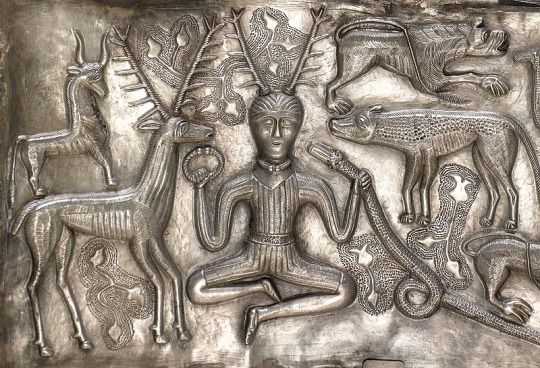
I/ What we actually have
As with a lot of Gallic gods, Cernunnos exists not in legends or myths, but through a name and a visual. The name Cernunnos is found three times all on its own in Gallic documents. One was a Greek inscription from Montagnac that only says "This is dedicated to Karnonos of Alisontia". The other two are identical inscriptions found in Luxemburg (near Steinsel), votive inscriptions of wish-offerings merely saying "Deo Ceruninco". There is actually a fourth inscripton of the name Cernunnos - and it is from this one that we get the spelling we use today - but it is a special one. Unlike the other three, this one has a picture alongside it identifying the god visually. It is the famous "pilier des Nautes" found under Notre-Dame-de-Paris, the "pillar of the Nautes", the "pillar of Boatmen", considered one of the most important Gallic monuments (because it depicts a set of divine portraits with their names explicitely spelled out).
It is only thanks to this pillar that we know today that the many depictions of a male horned god found across Gallic art are meant to be Cernunnos. There are too many visual depictions of him to be listed here (sixty or so were found by archeologists), but among the most famous is the one I put a picture of above: the Cernunnos of the Gundestrup cauldron found in Denmark.
Here is what Cernunnos looks like on the pilier des Nautes:
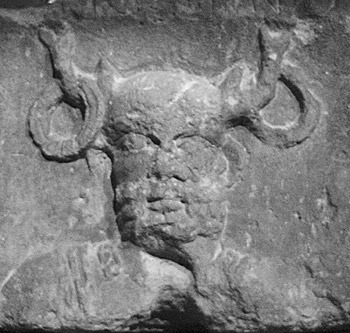
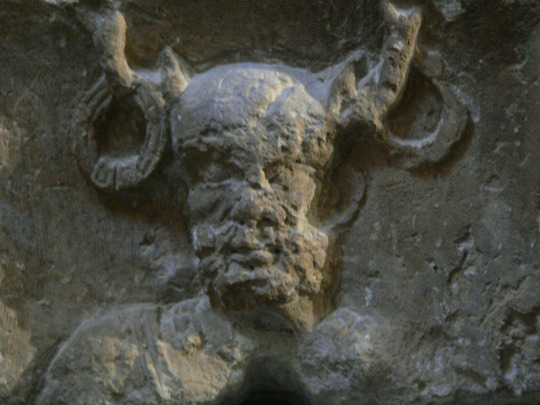

So, we have a name and a bunch of pictures. Let's try to break it all down.
When it comes to the name, Cernunnos/Karnonos, it is commonly agreed by etymologists and those that studied the Gallic language that it means "the horned god". "Carnon/Karnon/Karn" was known to mean "horn", both in the sense of animal's horn and a blowing instrument - it was tied to the Gallic tribes known as the Carni and Carnutes, and to the Celtic carnyx. The "kern" part is also considered to be equivalent to the Old Irish "cern", which was associated with horned beasts. Some have pointed out that if the "Cern" of "Cernunnos" means horn, the "unnos" could be a suffix meaning "beautifully" - so instead of Cernunnos being the "horned god" or the "horned one" it would mean "He who is beautifully horned" or "He with beautiful horns". But all in all, his name stays connected to horns.
[But is it truly his name? This is another debate typical with the gods of Gaul: we do not know the differences between the proper names, the titles and the nicknames. It could be (to take a Greek comparison) like Hestia's case, where he names literaly means "hearth" but is a proper name ; or it could be like the "Old Man of the Sea" which was a generic nickname for a whole group of sea deities.
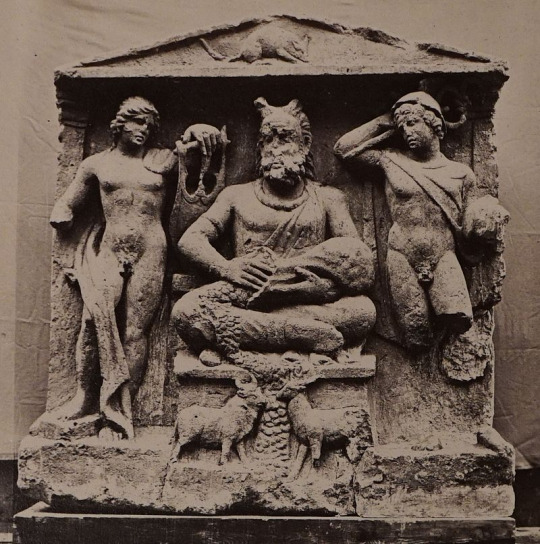
Now let's talk about the images of the god. Thanks to having so many depictions of him, we can identify recurring traits that define his visual.
Cernunnos always appears with his legs crossed, in a position (the "lotus" or "yoga positon" to take Asian terminology) that is considered, depending on the sources, either "very unusual for a god of Gaul", either "absolutely typical of Celtic representations of gods, warriors and heroes"... Well, he is almost always in the "lotus position" - in rare cases, he can be standing up. Cernunnos is also always wearing a torc, the traditional Gallic ornament, though he isn't always wearing it around his neck as one would expect: sometimes he holds it in his hands, other time it hangs from his antlers. Speaking of antlers: as we said, Cernunnos is a horned god, and he is usually depicted with antlers. But sometimes, more rarely, he rather sports goat horns - maybe it is a Romanization effect, as he got confused with Pan?
Cernunnos is always a male figure, though his actual age is unclear. Sometimes he is a mature and bearded man, but we also have "ephebe" depictions of him as a beardless youth - that some researchers even go as far as to describe as "child-like". Similarly, he keeps oscilatting between being a singular entity, and a triple-god with three heads or three faces. The disposition of the three faces can be really weird and freaky - for example, he can have a regular human head, and two small human faces growing from either side of his neck, or from the top of his head.
He usually always has a bag or basket with him, a bag that he eithers opens or that is simply sitting before him, spilling its content: sometimes the bag is filled with food, other times with coins, and other tims yet with grain. Cernunnos is usually sitting in the middle of a trio (as in two other humaoid or divine figures are by his side), or he is surrounded by various animals - which he can be seen holding with one hand, or petting near his lap. There are various animals he is associated with - we have seen him with stags, with bulls, with rats, with dogs, with lions, with goats... He is most notorious for being often depicted with the symbolic-mythical beast of Gaul known as the cryocephal snake: a ram-headed snake, whose exact meaning is still unclear to this day. However, Cernunnos seems to really like them: sometmes they just sit side by side, sometims he holds it by the throat, sometimes he feeds it, and other times two of them sit on his lap.
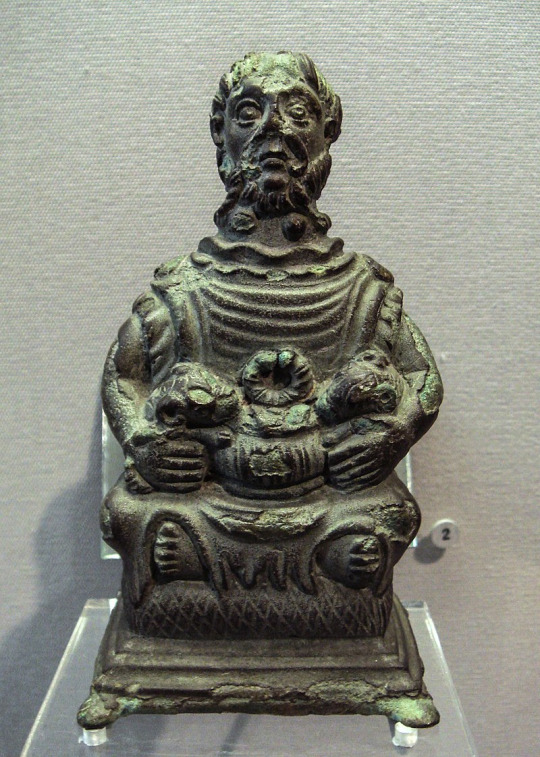
(This depiction above lacks any horns, but there are two holes at the top of the head implying that the horns were a different part of the statue added separately - which is very interesting in the theory of Cernunnos having antlers that "fall")
One of the problems with the Cernunnos visuals is that it is not clear where they stop, as we got a wide range of variations between the animal and the man. For example, there are strong theories according to which Cernunnos appears on the Strettweg chariot, as the tiny deer with oversized antlers that two men are holding (which would mean Cernunnos could be depicted as a full stag without human traits):
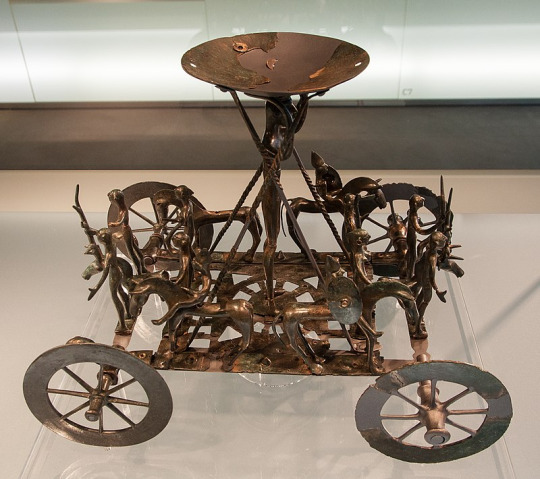
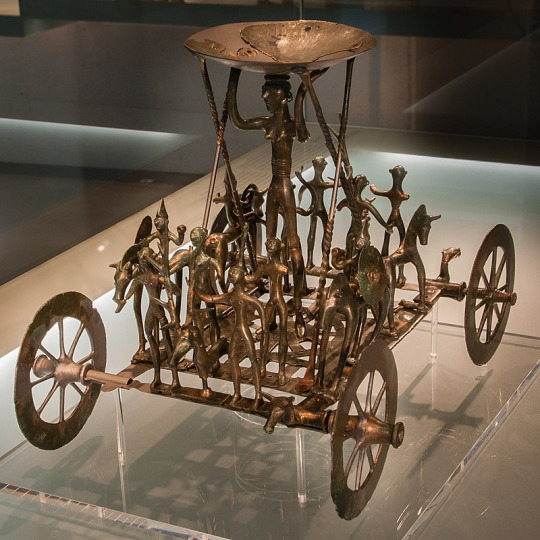
And on the opposite spectrum, a Gallo-Roman statue was found in Amiens of a fully human deity... except for one deer ear on the side of his face. One of the theories to explain this bizarre statue of the first century claims that it is an hyper-Romanized depiction of Cernunnos - though other theories do exist (for example, when the statue was discovered, it was originally believed to depict Midas, with a variation of the "donkey ear" punishment):
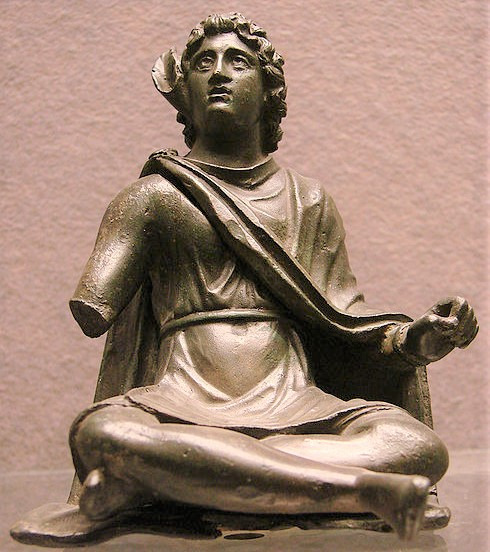
And you also have in Bouray a cross-legged god with deer legs rather than antlers or ears:
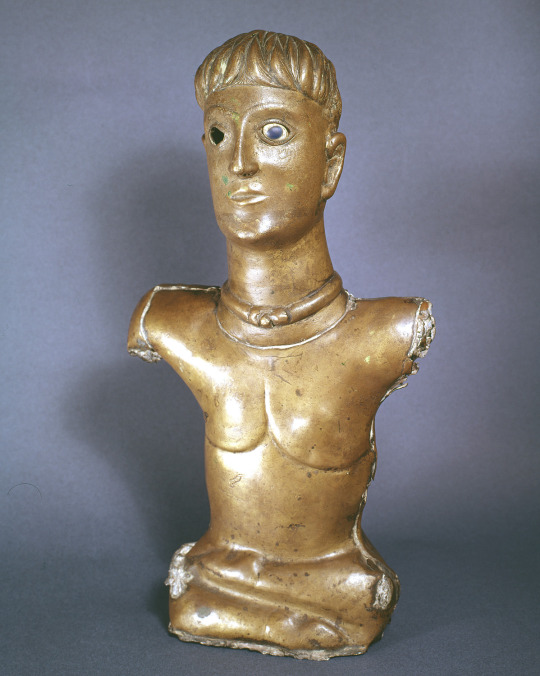
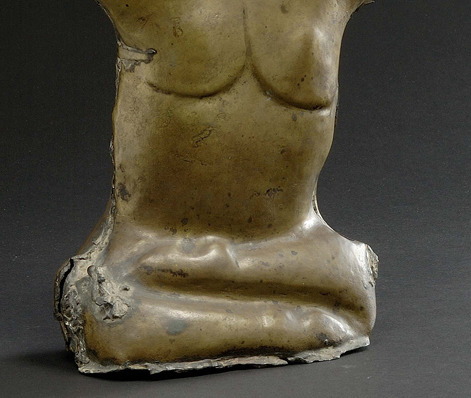
Given how "late" the visual depictions of the gods of Gaul was, and how the Romanization of Gaul strongly encouraged and favorized the depiction of deities as humanoids (to fit with the Greco-Roman deities), it is very likely that Cernunnos started as a divine stag, as fully animal, and then slowly, especially under the Roman influence, became more and more humanized... (There's also a fascinating case of antlered-goddesses at Clermont-Ferrand and Besançon, but that's for later).
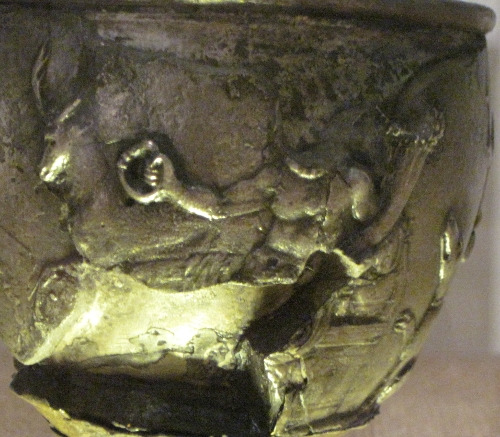
II/ Some theories
Now that we have the name and the visuals done... What's Cernunnos deal? Again remember we can only make theories based on these fragments and their context - but we do not know for certain if it is the truth.
A: It is agreed that Cernunnos is a nature god, and a god of abundance. The fact he is half-stag, and usually depicted with animals, and even holding them in a gesture of domination or use, shows that he is a fauna god, which prompted some researchers to identify him as one of the avatars of the "Lord of Animals, Master of Wild Things" archetype of Indo-European myths. But more importantly we are certain that he dealt with abundance and prosperity - thanks to him always having a big bag of grain, food or money. He was very clearly a god of riches and wealth - be them natural (grain, food) or manufactured (coins). Some have highlighted the idea that this tied to the symbolism of "forests that have big strong stags in them are bound to be fertile places filled with resources". Cernunnos' ties to abundance cannot be denied because in some Classicized depictions of him (such as the silver goblet above), he is literaly seen holding a cornucopia, aka a horn of abundance.
Some people even want to push the domain further by thinking Cernunnos might have been a god of sexual and reproductive fertility - but this is not based on any visual or religious clue. Rather this theory ties on the European symbolism of the stag as a symbol of virility and reproductive prowess, so it is a purely contextual reading, to be handled carefully. We are only truly certain that Cernunnos offered lots of money, lots of grain, lots of food, and lots of animals (him being surrounded by animals might be an extension of the "I offer you this bag of grain" visual, since animals were hunted down for food, so he isn't just a god of good crops and economic riches, but also one that ensures a plentiful hunt).
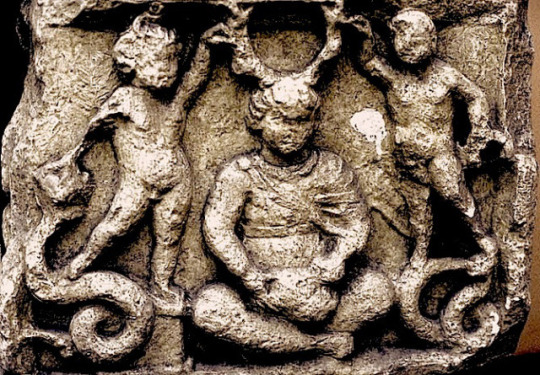
B: There is a strong theory going around that Cernunnos might be a seasonal god, or a deity of the seasonal cycle. This idea comes from various elements pieced together - and which added with the A theory above, would make this go a sort of "Father Nature" figure. It all starts wth the European symbolism of the antlers and the stag in general: given the antlers fall and grow with the turn of the seasons, the stag has been used heavily in Europe as a way to measure the year or symbolize seasons. Some researchers theorized, based on how the size of Cernunnos antlers changes through depictions, and on how he is sometimes a beardless youth sometimes a bearded mature man, that Cernunnos, like the stag, had a seasonal cycle. For some he just loses and grows back his antlers (there is a Cernunnos depiction at Meaux with what seems to be the stubs growing back after antlers fall, which would support this theory), but others push it further by claiming the god died and was reborn each year with winter/spring - an idea inspired by the Indo-European archetype of the dying/sacrifical vegetation god.
There is a specific depiction of Cernunnos that ties into this whole - and I will have to trust Yann Brekilen's word for this, as I couldn't find any picture of the engravings he described. According to him, on the Gallo-Roman Germanicus Arch/Arc, by Saintes, there is a dual depiction of Cernunnos. On one side of the Arch, he is part of a trio: he is sitting crossed-leg with antlers on his head, but naked (usually Cernunnos s clothed in some ways). By his side there is a man armed with a club/mace (which might be tied to the "god with the mace", we'll see that in later posts), and a woman holding a cornucopia. Now, that's on one side of the monument - but on the opposite side, the scene is reproduced... with both the armed man and the antlers of Cernunnos missing, only leaving a regular cross-legged naked man, and the cornucopia-woman. Speaking of this cornucopia-woman: there are repeated talks and interpretations of any female figure by Cernunnos' side to be a "Mother-Goddess" or Earth-Goddess supposed to be the wife/companion/lover of Cernunnos. This is all part of an effort to make Cernunnos a "father-god" (which makes sense in some ways), and it ties into the whole reading of his myth as being a seasonal cycle (the god dying and resurrecting after impregnating his female counterpart ; something the Wiccan mythology for example reused in their beliefs), but... If you ask me, I am not really convinced? A lot of people insist on there being a "Mother Goddess" clearly by Cernunnos' side, but sometimes you see these people reinterpret a lot of the visuals, and it is not obvious that the female figure is with him (Cernunnos is usually surrounded by male figures rather than female ones). Plus, we know the Mother Goddess of Gaul tended to come in three (the famous Matronae) so... I am a bit doubtful of that, but that's just me and because of a lack of convincing evidence.
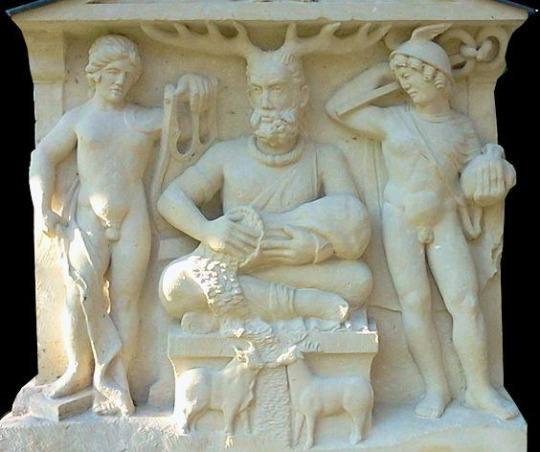
III/ Comparisons and equivalences
As I said in my introduction post, a lot of what we know about the Gallic gods comes from the syncretism the Romans operated with their own deities. And with Cernunnos it is... complicated. Because we do not know exactly who was the Roman equivalent of Cernunnos (since the Romans did not speak of him), and based on researches we have two likely candidates. It is very possible Cernunnos might have been split into those two Roman deities, or at least that his attributes led him to be interpreted as two deities mixed in one.
On one side, there is a very strong and popular theory that Cerunnos was the god Cesar, in his description of the religion of Gaul, called the "Dis Pater". "Dis Pater" was the Latin god that was equated and synthesized with the Greek Hades under the share nickname "Pluto", "the rich one". This was because Dis Pater was not originally a god of the dead in the old Italian religion - he was an underground god, indeed, but a chthonic god of riches and wealth, an earth-god of fertility (his very name meant "Rich Father"). This is what tied him to Hades, the richest of the Greek gods - and made him the new god of the underworld and the dead, Pluto. So, equating Dis Pater with Cernunnos makes sense as we do know that both deities were strongly associated with an earthly form of fertility: Cernunnos, just like Dis Pater, brought grain and earth-grown fruit, as well as precious metal (in the form of coins). Not only that, but Cernunnos was strongly associated with the ram-headed snake, and while we don't know much about this mythical being (typically a companion of male gods in Gallic art), it seems to have been a chthonian symbol, and perhaps even a form of guardian of the world of the dead (or a guardian of underground riches cousin of the dragons of legends). This is what led many to interpret Cernunnos as a chthonian deity, perhaps even an afterlife deity - a tradition that seems to have been in early Christian art, where Cernunnos was often associated with the "mouth of Hell" or the "entrance to Hades" (like the 9th century manuscript Stuttsgart Psalter, which illustrates Cernunnos in a depiction of the Christ descending into Limbo.
If Cernunnos is indeed Cesar's Dis Pater, then it would be extremely interesting, because Cesar wrote in his records that the peopleof Gaul believed Dis Pater to be their divine ancestor, and the "father of their race". Aka, the Gallic Dis Pater is meant to be an All-Father, the first ancestor of the Gallic tribes, and the origin of the human race (or at least of the people of Gaul). If Cernunnos is this Dis Pater, it would confirm his role as a "Father-God" and his links to a potential "Mother-Goddess". (It could also explain why he so persistantly wears a torc, as an emblem of the civilization and traditions of Gaul) If Cernunnos is also the Dis Pater, it would give him a role as a nocturnal god, since Cesar resumed in his texts (or rather "recaped" since he was doing a report based on Posidonius own records) that it was because the people of Gaul descended from Dis Pater that the druids measured the time not in "days" but in "nights"...
The other very likely candidate for the Romanized Cernunnos is the one we call the "Gallic Mercury". We know that Mercury was one of the most popular and widespread gods of Gallo-Roman gaul. Cesar did mention him as one of the most important gods venerated by the Gallic tribes before the omans arrive (though this would contadict the is Pater theory, since Cesar identifies Dis Pater and Mercury as two different deities in the Gallic beliefs). Still, Mercury was a god of commerce and riches before all - even more so than his Greek counterpart Hermes - so it makes sense that he would be present in the Gaul province of the Empire, which was big heart of commerce. And where Mercury has a pouch of coins, Cernunnos has a full bag of them... And in several Gallo-Romans depictions one of the two gods that surround Cernunnos is very obviously Mercury... [Several of the images in this post are of the altar of Reims, which depicts Cernunnos surrounded by Apollo on one side and Mercury on the other] And Cernunnos' presence on the Pillar of Boatmen implies he was tied to the fluvial sailors, and to the fluvial commerce and travels... And in Luxembourg we have Gallic depictions of stags vomitting coins, again insisting on how the stag was associated with riches... Even if you take Cernunnos as a chtonian god or death god, it ties to Mercury's role as a psychopomp inherited from Hermes ; and Mercury's presence by Cernunnos side on the altar of Reims for example makes sense if you consider one of the deities Cernunnos was conflated with was Pan (hence the goat horns) - aka, the son of Hermes... Everything is tied together into one big convoluted web of inter-mythologies.
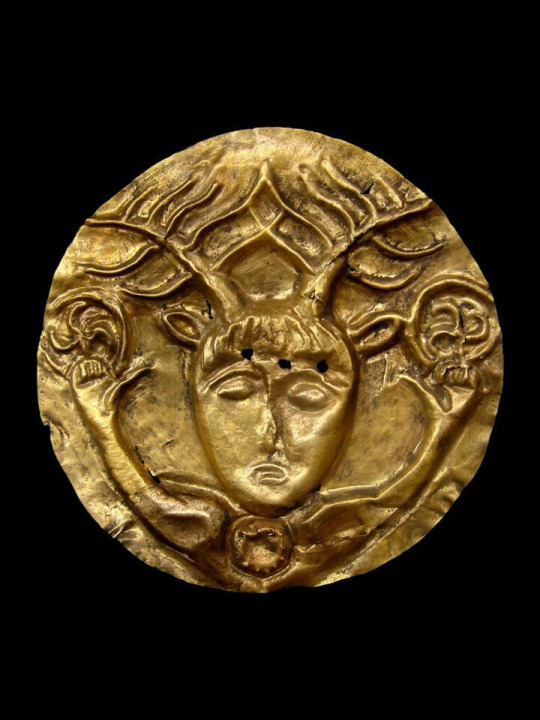
And when it comes to comparisons to other Celtic mythologies, things are a bit... In French we say "vaseux" - basically there were parallels drawn between Cernunnos and Celtic figures of the Isles, but they rely on very meager if not unstable links. For example some have tried to identify the Cernunnos of Gaul with the Irish figure of Nemed (interpreted as a "stag-god" leading "stag-people" or "deer-people"), and in return the battle between Nemed and Balor for the land of Ireland was projected onto the scene depicted on the Arch that I described prior - a battle between the horned god and the god with the mace for the "earth-mother", the cornucopia woman, the land-goddess. The acceptance of this scene between the horned god and the mace god as a battle for the mother-goddess (which, I insist, was not PROVEN in any way and is completely hypothetic and theorized with no definitive proof - maybe the mace god is here to sacrifice the horned god for the cornucopia-woman, or maybe he is just here to cut off his antlers, or maybe the cornucopia woma cheats on Cernunnos wit the mace god, we cannot know), also led to vague comparisons being drawn to the story of Pwyll and Arawn and how they exchange each other's identities, but we are really in a stretch here.
More interestingly there is a Welsh comparison that could indicate a leftover of a Christianized Cernunnos in an Arthurian setting: the Owein tale (Mabinogi): Kynon, a knight of King Arthur's court, describes how in his youth he had to encounter an ugly knight clad in a black armor who had the information he needed to find his enemy. The knight lived by a "fountain" (a water stream) surrounded by wild and ferocious animals - and to give Kynon the information he needed, the ugly black knight struck a stag nearby, and the animal lowers its head in the direction Kynon must follow. It is very plausible that this supernatural knight who hits an informative stag and who lives surrounded by wild animals is a form of Christian censorship or caricature of a Cernunnos figure, going from a wise and benevolent stag-god to an ugly evil knight who abuses animals, and who has his duality human/beast split between the knight and the stag.
There were also tenuous elements that made people consider the Irish Conall Cernach (known for being one of the sidekicks of Cuchulainn) as a diluted version of Cernunnos as a "Master of Beasts" - more precisely an episode in "The Cattle Raid on Fraech" where instead of killing a monstrous snake, Conall somehow tames it and wears it as a belt, has been compared to Cernunnos' handling of snakes and ram-headed snakes. And don't even get me started on the many, MANY saints of Catholicism that are supposed to be leftovers or reinventions of Cernunnos (saint Ciaran of Saighir, because he tamed wild beasts including a stag ; or the saints of Bretagne Edern and Théleau both supposed to ride a stag instead of a horse...).
The complicated thing (well ONE of the complicated things) with Cernunnos is that he is tied to the stag, and the stag was one of the most prominent smbols and images of the medieval and proto-medieval imagery in Western Europe. You had lot of old mythology stuff that survived in modern days, but you also had lots of medieval symbolism and images (like how the flying stag was one of the symbols of the king of France), and a HUGE re-use of the stag by Christianity in various forms (from the antlers falling being used as a symbol of the Resurrection, to the hunt for the white otherwordly stag of Celtic myths suddenly becoming a hunt for Christ incarnate when a glowing cross appears above the stag's head...). As such it is hard to pin-point what the Gauls truly believed the stag meant, versus the stag symbolism that arose in the Middle-Ages.
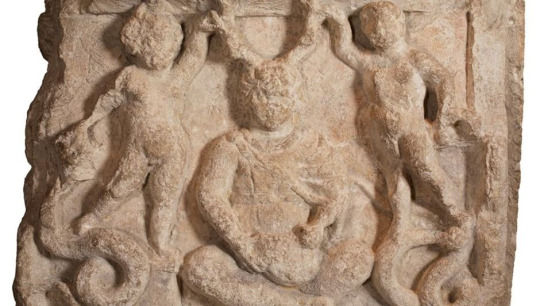
To conclude this post, while I said I had my doubts with systematic identifications of Cernunnos as a companion of a Mother-Goddess, I want to briefly return about a fascinating trivia of Gallic researches: the existence of a female version of Cernunnos, a "Cernunna" we could jokingly say.
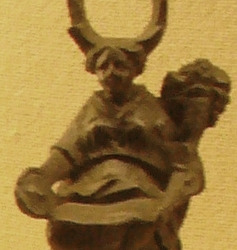
Little figurines and statues were found of a horned goddess - sometimes with antlers! - in both the area of Clermont-Ferrand (which was the domain of the Avernes folk) and around Besançon (the Séquane folk). Who were these goddesses? Local variations of Cernunnos? Sisters, daughters or wives of the god? Or completely unrelated deities? Were they one or several (some are more matronly, motherly figures such as the one with antlers above, others have Venus-like poses unveiling their breast and legs such as the bull-horned below)?
We will probably never know - but while they can be incarnations of this famed "Mother-Goddess" companion of Cernunnos everybody speaks about (and links to the importation of the cults of Demeter and Cybele in Gaul), it is VERY likely these statues date from the Gallo-Roman era and from a Romanized version of the Gallic religion. Indeed, they are all tied by their attributes - they hold a cornucopia, and a "patère" (sacred vase for religious libations). Attributes present in very Romanized Gallic goddesses (such as Rosmerta), but also in typical Roman deities (mainly the lares). Add to that how the adjunction of a male attribute (the stag antlers or bull horns) to a female figure is VERY unusual for Gallic depictions (where the genders are neatly split), while the divine androgyny was a feature of Greco-Roman mythology (the effeminate Apollo and Dionysos, the masculine goddesses Athena and Artemis, the mythical Hermaphrodite...), and it is very likely these statues of the "Cernunna" are the result of the Roman religion "breeding" with the Gallic beliefs...
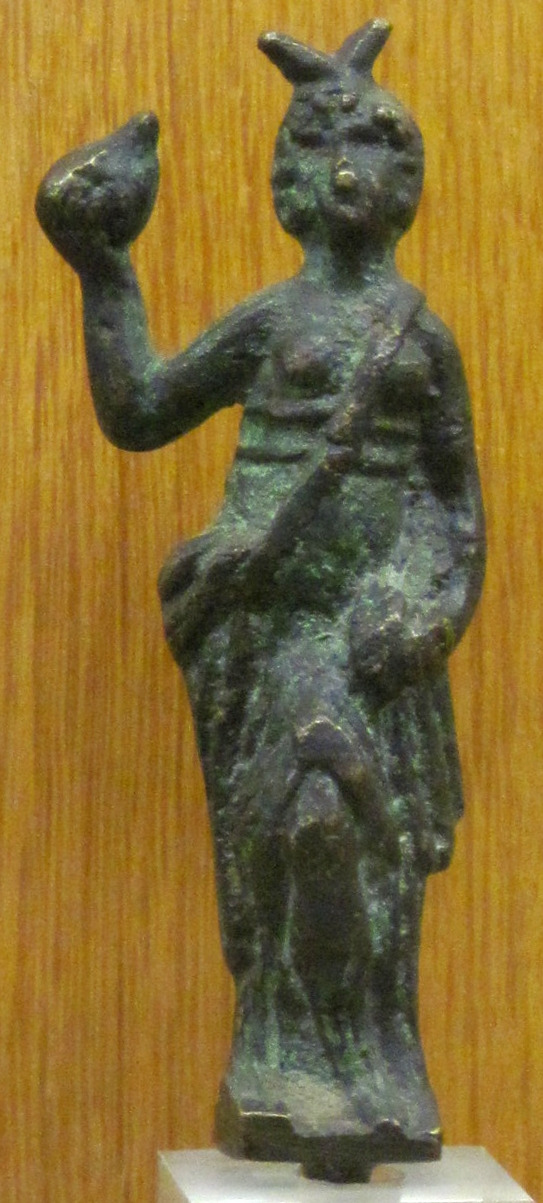
#gods of gaul#gallic mythology#cernunnos#ancient gaul#religion of gaul#gallic religion#gallic gods#gallic goddesses
178 notes
·
View notes
Text
On Apollo and fatal flaws
Vague question for my fellow apollogists out there: what do we think Apollo's fatal flaw is? I write this realizing that, in all five books of the series, all told from Apollo's point of view, we never actually have it explicitly stated, either from Apollo's knowledge and refusal to share (which, strangely, seems to me like something he would tell us), or from him not actually knowing, either.
Simply stated, a fatal flaw is any kind of weakness of a hero, god or mortal, that can be exploited and can cause the downfall of that character. That being said, we already know some that generally scope out the larger range of what they can be:
Percy: excessive personal loyalty
Annabeth: hubris/pride
Nico: holding grudges
Thalia: ambition
Leo: feeling inferior
Piper: low self-esteem
Luke: wrath
Jason: hesitation and excessive deliberation
And we are certain that immortals have flaws like these, too. Although it isn't explicitly stated in canon what Zeus' fatal flaw is, it's exceedingly obvious that it's paranoia and hunger for power, as well as his sexual infidelity.
I feel like we can easily knock some flaws off the list already:
Holding grudges is off the list for the main reason that, if there's one thing Apollo oozes, it's forgiveness, and the fact that he is always ready to give second chances to people who have wronged him and the world (Lityerses, Luguselwa, Meg, etc.)
For the same reason, I'm going to knock off wrath. Yes, he has moments of rage, but so does everybody else! It's human nature, and, as stated before, it's usually overshadowed by Apollo's choice to let go of that anger and choose forgiveness instead.
Ambition is an interesting one, but it's not at all something that really comes up in the series to the point where it ends up being powerful enough to be his fatal flaw. He rarely seeks power he didn't already have before, especially when you consider he is Zeus' most powerful son, and one of the most powerful gods period. Why would he need more power? Unless, of course, you choose to point out that one time he tried to overthrow Zeus, but I'd argue he was acting more out of a place of 'hey please be better at your job' than 'I want your title and position', which actually falls more under Poseidon's motivations in that myth.
Interestingly, there's a certain aspect of Apollo's character in the myths that totally screws the pooch in terms of this discussion, and that's the fact that Apollo, throughout the stories of Ancient Greece, is a typical example of perfection. Literally, he's written to be virtually flawless, the paragon of young men, and (in the context of Ancient Greek culture) doesn't have many moments of rage, selfishness, or paranoia, or at least, not as many as other gods (looking at you, Artemis).
HOWEVER, as much as the myths seemingly act like he doesn't have a glaringly obvious flaw, we as a part of Apollo's inner circle/audience know he's got one - I mean, look at him! It's in there somewhere, nobody's perfect, and I don't think anybody's pretending as such for Apollo. What irks me is that we know Apollo is not lacking in general character flaws, but there is one, beyond a doubt, that shapes his inner core irreversibly. And we don't know it.
Thankfully, though, we've got five books of content that might help us come to a conclusion.
The Hidden Oracle, being the beginning of the story and the beginning of Apollo's character development, is where we would get an inkling of what Apollo wants us to think his fatal flaw is. To us, Apollo appears vain, self-centered, and, frankly annoying. And he does these things on purpose. Or at least, he tells us these things.
That's the thing: if you look past all the fluff Apollo spits out to the audience throughout the first majority of the book, before his children are taken into the forest, you'd find that his dialogue, aka how the other characters of the story hear and see him, doesn't really reflect that. Most of the annoying, self-centered brattiness is only on the page, and not as obvious in his personal interactions (not saying they're not there, but it's so much worse in his internal monologue). So, what does this tell us?
That those aren't his fatal flaws. He's very good at pretending that they are, probably because, as I've read several other metas very cleverly explain, that this is what gods are supposed to be, and, Apollo, in his desperation be his father's golden child again (or, also to avoid his wrath, take that how you will) has built up a very elaborate mask for thousands of years, because that is what he is not. He's trying to be glossed over in the vast sea that is the gods, and it's not really working because, well, he got turned into a mortal. Again.
As we pass through books 2 and 3, we're still not quite past the whole "pretending to be petty and self-serving because this is what I am supposed to be as dictated by the laws of my immortal people and my father". That, almost certainly, doesn't come until the latter half of The Burning Maze. So it's further safe to assume that our best guess as to his fatal flaw probably coincides with his more honest moments with the audience, eg. books 4 and 5.
Now, I know a popular common answer to this whole question is that it's his ego and his pride. But here's the thing: as we move on to the second half of the series, we get an interesting revealing of Apollo's perception of himself. To put it plainly: Apollo is not a narcissist, as much as he pretends to be (see the above points). Honestly, he might actually hate himself and what he's become as he learns to take a more critical view of himself as the series goes on. Drawn in direct antithesis to his moments in the first two books, when he tells us that he assumes that anybody he meets is willing to help him, after the peak of his development (marked by his promise and Jason's subsequent death), this isn't the case. That's why I'm pretty okay with putting pride and ego towards the bottom of my list of possible fatal flaws for him.
Honestly, if I didn't know any better as we reach the end of the series, I'd say Apollo's fatal flaw might fall somewhere closer to poor self-esteem, insecurity and self-doubt, but for some reason, that doesn't quite fit. I'd argue that a lot of those feelings probably stem from being stuck in the inadequate body of a mortal with a tiny fraction of his usual power - of course he's going to feel like that. That, and it's almost the direct opposite of what his flaw is perceived to be by other sources, so it feels like too large a leap to me.
I'm deliberating from my point, which is this: I still have no clue what his fatal flaw is.
It's not:
narcissism
pride
OR on the other side of the spectrum:
low-self esteem
self-doubt
OR the list of things we knocked off earlier:
holding grudges
wrath
ambition
And when you compare to other characters he might also be like, I would argue he's a totally different animal. The only character I could see a similarity with is Percy. But, again, it's just not the same. Percy's flaw, excessive personal loyalty, still doesn't really fit because, while I'd argue that Apollo's never really put in a situation where he's had to choose to save the life a mortal friend over his task of restoring the Oracles, I do believe he has a strong sense of duty. No, I don't think he would sacrifice Meg's life to do that job, but it's not something we see him forced to pick between (that I can think of, at least). I like to think that, on one hand, Percy would flat-out refuse to do his duty to save the life of a friend out of principle, whereas Apollo might find a clever loophole to save the friend, do the duty, and end up doing harm to himself. If anything, while Percy would be ready to burn the world to save a friend, Apollo would be ready to burn himself first.
That, I think, is our biggest indicator. Apollo loves his friends and the world. He wears his heart on his sleeve, this is something the Triumvirate exploits to no end.
Athena tells Percy something in the PJO series (the Titan's Curse, I think?) and says that the most dangerous fatal flaws are the ones that are good in moderation. And, of course, Apollo is a main character, so naturally his fatal flaw will fall under this category.
I think Apollo's fatal flaw is of the same breed as Percy's, but isn't really the same creature. I'm sure there's a more eloquent way to put this, but it seems to me that his fatal flaw has something to do with his tendency to be self-sacrificing, easily forgiving, and empathetic. He's been stabbed in the back several times and every time chooses instead to show trust and camaraderie, to see the best in people, and give them another chance to prove themselves: with Meg, Crest, Lityerses, Luguselwa, Meg's adoptive siblings, and many, many more. That seems very dangerous in the wrong situation, yes? Especially someone in Apollo's position - there are plenty of bad people who would be ready to take advantage of this.
And what is a story if not the hero learning to overcome their fatal flaw? And, really what is the Trials of Apollo all about? How do we end? What choices does Apollo make for the future at the conclusion of the Tower of Nero that directly contradict his overwhelming urge to choose forgiveness and let others try again?

The Tower of Nero, Chapter 36
At the end of any good epic story, the hero learns to overcome their weaknesses and flaws and do the right thing regardless. For Apollo, this comes when he refuses to forgive one person: Zeus. Apollo ends his pentalogy with coming to an understanding of himself and his relationship with his father, learning to overcome that tendency see the best in everyone, and realize that not everyone can choose to change for the better like Apollo has.
EDIT: a masterlist of my other metas
465 notes
·
View notes
Text
The selective application of real world standards in the ACOTAR fandom is truly the most bizarre thing I have ever seen. When discussing Nesta's behavior or Lucien's actions or Tamlin's style of leadership or... anything Tamlin does, really, we have to use real world standards and ignore the circumstance and context, ignore that this is a fantasy world and hold them accountable by our values. They cannot act like they are in a world that is fantasy, and if they do they are faulted for it. They cannot act on the knowledge they know and have of their circumstances, and if they do they are faulted for it. They cannot merely exist within the broken system that is Prythian's power hierarchy, rather they are faulted for not attempting to better things and make their world mirror ours. But the minute those standards are applied to Feyre and Rhysand or anyone else, suddenly we need to keep in mind again that this is fantasy and to not judge by real world standards. Feyre and Rhysand are praised by the narrative as progressive leaders attempting to change the system of power. They objectively aren't, because you truly cannot be progressive while actively upholding the system that oppresses others and, for example, leaving brown women and children to rot in the places you dislike because you've stereotyped all the brown men as savages too dumb and uncivilized to change whew the racist writing of the Illyrians jumps out, nor is it progressive to remove your wife's bodily autonomy by keeping information about your wife dying in childbirth from her. If you get upset at that being pointed out because ~it's fantasy~ then you can't exactly write 10-paragraph long essays about how horrible other High Lord's feudal systems are, now can you? After all, it is fantasy. Feyre and Rhysand are adored for their "healthy" relationship, despite that being woefully not true by any real-world metric. Hell, with having the male get so jealous when other men look at his mate that he feels the need to fight them, break the bones of people who call her a whore, and have the couple become incredibly co-dependent once they mate, mating bond in and of itself is wildly unhealthy by real world standards! If pointing this out bothers you because ~it's fantasy~ and you believe you can't use real world standards to judge a relationship between two magical creatures in a retelling of a Greek myth, then you can't write essays about the healthiness or unhealthiness of any other relationship in ACOTAR. After all, it is fantasy. Feyre and Rhysand are excused for their atrocious actions that harm and displace tons of innocents because they are "acting for the greater good" or lack the information to wait at a later time for revenge, despite the dire consequences their objectively horrible actions. If this bothers you because ~it's fantasy~ and they don't need to act by real world standards and every horrible thing they do can be excused with "it's for the greater good" or "they didn't have enough information at that time", then you can't critique other characters who don't abide by real world standards of what behavior is ok and not because they canonically have limited information or are doing something for "the greater good." After all, it is fantasy.
Either everybody is critiqued by real world standards, including the faves, or no one is, including the characters you hate the most. You can't hold a certain group accountable by real world standards and be surprised when people do the same right back.
269 notes
·
View notes
Text
Bestiaryposting Results: Slagzogg
This is, interestingly, our third consecutive Beaſt that's actually a common everyday animal pretty much all over Europe, including the area where this manuscript was produced. This is interesting to me because the three are handled very differently. First we had the salamander, which I'm pretty sure got mentally separated from the actual animal somewhere, probably because people use different terms for the real-life amphibian in different regions and languages, and not everybody is going to recognize that it's just the Greek word for the same animal. Second we had the deer, which it seemed like the manuscript producers did recognize, because the illustration is clearly a deer... but elements of the entry are just nuts (As @sweetlyfez said, "How do you make up this many wild myths about a guy you live with"). And now we have the [redacted until end of post], which is just given a completely mundane, if engaging, description with the only weird part being the symbolism attached to it.
I think it might also be our first domestic animal -- the entry even talks about the difference between wild and domestic varieties -- which seems like it's worth noting.
Anyway, as usual people who don't know what I'm talking about should check https://maniculum.tumblr.com/bestiaryposting. The entry this week's artists are working from can be found here:
This is another one where I almost didn't put it in because it seemed super obvious what it was, but the artists have done a superb job not drawing that. Excellent work on everyone's part, and it can be found below the cut:
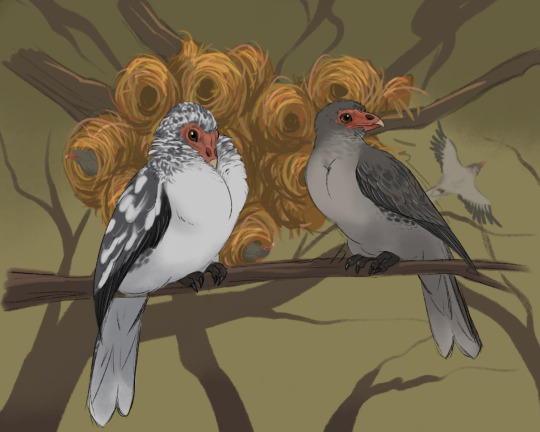
@silverhart-makes-art (link to post here) shows us both a domestic and a wild Slagzogg; the design of the domestic one makes me think of fancy pigeons, which I think is a pretty good direction to take here. The vulture-like faces really improve the design also. Very good birds, and you should go check out the linked post to hear about the design decisions and real-life inspirations behind this one; I think it's pretty interesting.
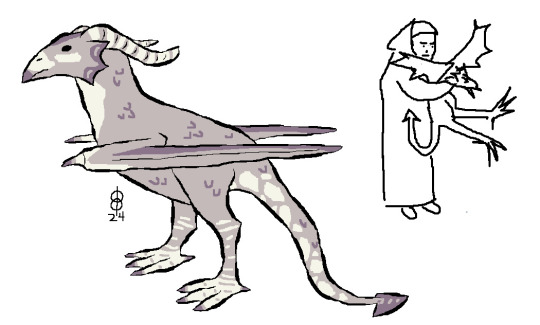
@pomrania (link to post here) observed that, though the entry mentions beaks and flight, it doesn't actually say "bird", so they can draw a pet dragon and have it fit the description. Fair call, and I think it turned out well. I like the contrast between the fairly dignified-looking creature on the left -- this is a Slagzogg who is on its way to win Best in Show -- and the sketch on the right of someone forcibly preventing it from getting into a fight. If you check out the linked post, you can see Pomrania's progress thread for this design.
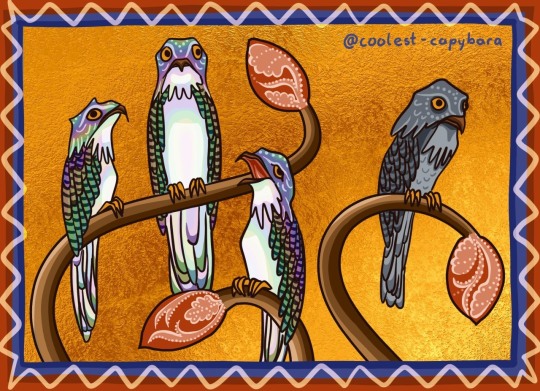
@coolest-capybara (link to post here) has made the eminently-understandable decision that if they're going to draw a bird with no specific anatomical details given, it's going to be a potoo. On the left we have three domestic Slagzoggs socializing, and on the right we have a wild one perching alone. I like how this incorporates the symbolism of the entry: we're told that the wild type is meant to signify people who choose a religious life ("those who keep apart from this world wear the modest garb of penitence"), and this wild Slagzogg does look a bit more serious and... monastic? Like, that bird is a nun. (Also, thank you for including alt text.)
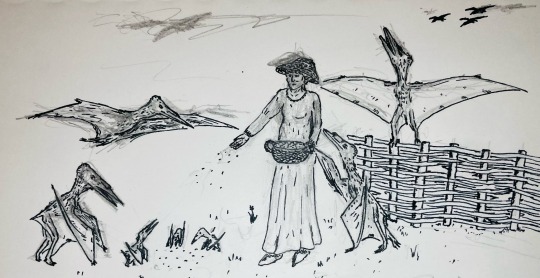
@cheapsweets (link to post here) also went with the direction of "well, it doesn't say 'bird'," and so we have this really charming image of a medieval person feeding their domestic... pterosaurs. Love it. Honestly, these alternate visions of the Middle Ages where people have entirely different domestic animals than our timeline are really appealing to me. Too much Dinotopia as a child, perhaps. Anyway, check out the linked post for substantially more detail, it's worth it. In fact, everyone reading this should just go ahead and follow all of the bestiaryposting participants. (Also, thank you for the alt text.)
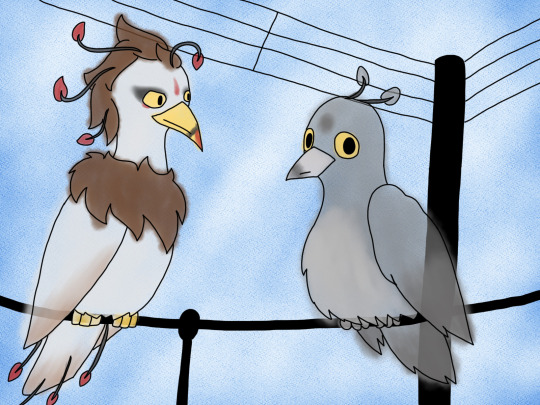
@strixcattus (link to post here) is clearly thinking of the modern day's feral pigeons, formerly the result of selective breeding by pigeon fanciers. We can see the "fancy" domestic version on the left contrasted with the wild version on the right. (I think it's interesting that everyone who's drawn both has put the domestic Slagzogg on the left and the wild Slagzogg on the right.) Anyway, as is usually the case with Strixcattus, the writing included in the post is absolutely worth your time and you should read it. And again, follow them, as well as everyone who has ever contributed to bestiaryposting. Go do it; you won't regret it.
Now, to the Aberdeen Bestiary.
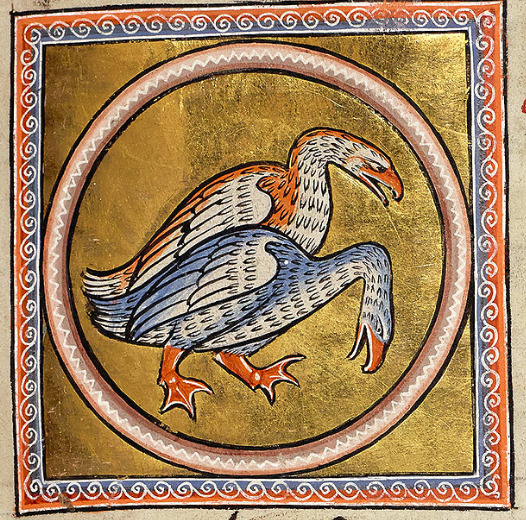
Beak shape aside, these are clearly geese.
I think the degree to which people guessed that varies somewhat; Strixcattus made a post suggesting they were leaning "pigeon", but Pomrania probably clocked it, because they described two Slagzoggs fighting as a "hissing match" despite hissing not being mentioned in the entry. I have no idea where everyone else landed.
Honestly, what I find interesting about this entry is that it's pulling symbolism while remaining pretty much entirely grounded in reality. Check this out:
The goose marks the watches of the night by its constant cry.
Okay, I don't know to what degree it's useful in marking time, but I don't doubt that geese make noise at night.
No other creature picks up the scent of man as it does.
That one I'm not sure about.
This next bit I cut because if anyone knows Roman history they'd nail it right out of the gate:
It was because of its noise, that the Gauls were detected when they ascended the Capitol. Rabanus says in this context: 'The goose can signify men who are prudent and look out for their own safety.'
Okay, that might be less history and more legend, but still, people know it, I think.
There are two kinds of geese, domestic and wild. Wild geese fly high, in a an orderly fashion, signifying those who, far away from earthly things, preserve a rule of virtuous conduct.
I can absolutely see medieval people looking up at geese flying in that V formation and going, "look how orderly these birds are; clearly they are virtuous creatures."
Domestic geese live together in villages, they cackle together all the time and rend each other with their beaks...
Yeah, that sounds like what geese would do in a village.
All wild geese are grey in colour; I have not seen any that were of mixed colour or white. But among domestic geese, there are not only grey but variegated and white ones. Wild geese are the colour of ashes, that is to say, those who keep apart from this world wear the modest garb of penitence.
This bit falls into the category of "I believe it, but it does not accord with my personal experience." Because if you told me that in Europe they had a variety of different aesthetically-pleasing domestic goose breeds, I'd have no problem believing that. And I'm sure some wild geese are gray. But I live in North America, so to me wild geese look like this:

And domestic geese look like this:
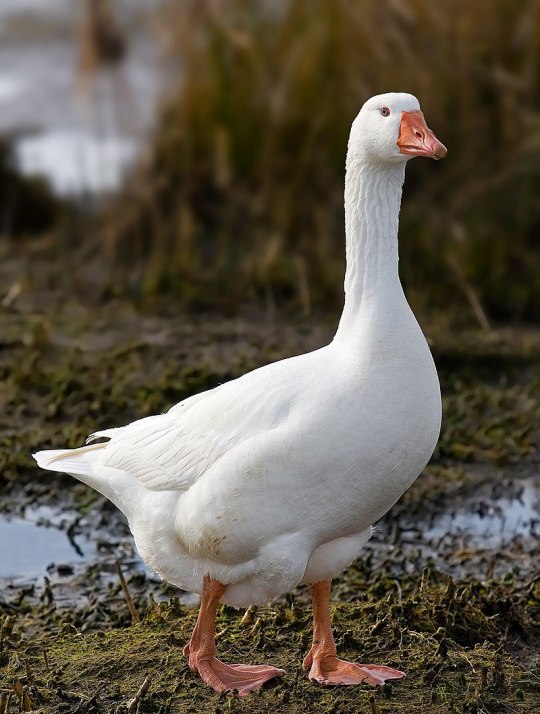
But again, I have no difficulty believing that the experience of the medieval Europeans was different from mine.
What really sticks out to me here is the fact that the characteristic behavior of domestic geese is to make noise and get in fights -- I think the Untitled Goose Game would have made perfect sense to a medieval audience.
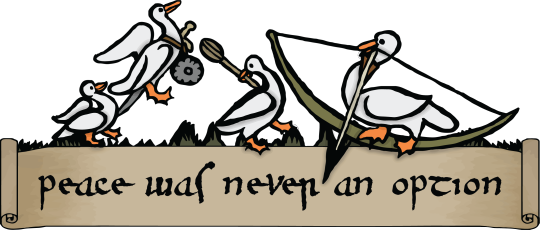
(After the Smithfield Decretals)
57 notes
·
View notes
Text
I don't think Greek Mythology retellings/adaptions/inspired/etc. are necessarily "evil"...but I DO think people REALLY need to understand that there's a huge difference between the actual mythology and certain media.
I feel like people have to basically do a "Fandom ___" to say the different versions. Like "PJO ___", "Hades game ___", "TSOA ___". For it to be understood that these depictions are DIFFERENT. I'm saying this as someone who grew up reading PJO and still has a soft spot for it. But as someone who really loves Greek Mythology as well, I sometimes get really SAD.
I'm going to use the comparison of Howl's Moving Castle with it's Book Vs. Movie. I enjoy both!!! But they are honestly very different. In the movie there is no "sister swap", Markle isn't a young teenager, Sophie doesn't throw weed killer at Howl, and many more moments. But I enjoy both because even though there are changes they still keep components that are ingrained into the characters!
In some Greek Myth retellings/adaptations/stories/etc., characters are...SO different from the source material. That's fine...Choose what you want with your story... But folks should know that the modern adaptations are NOT the source material!!!
It bothers me that a lot of these wonderful myths and stories are twisted up and seen so differently because of a modern version of them. You can have that character be "awful" or a certain way in your story. But I almost feel that as fans, it's not good to generalize them or see it as "This is the truth". People are hating the mythological figure when it's only in that interpretation they are like that.
In PJO, Ares is "Zeus' favorite", isn't a good dad, a misogynist, etc. The actual myths? One of his Epithets is LITERALLY "Feasted by Women", in the Iliad everybody basically bullies him with Zeus literally saying he hates him. He cries when he learns one of his sons is killed in the war. He literally kills someone about to rape his daughter. Ares isn't perfect but it makes me sad with how he's viewed and talked about when it's only in PJO he's like that. Same with Dionysus. Read the Bacchae, you'll love it.
In Lore Olympus, Apollo rapes Persephone (noticing the fact that modern takes on the myths add rapes where there never were hmmmmm) when he never did in any of the myths.
In TSOA, Thetis is cruel when in the Iliad, she is such a loving mother to Achilles. She grieved alongside her son over Patroclus. Also with Agamemnon. In Ipheginia at Aulis, Agamemnon is a MESS. He adored his children.
In Circe, Odysseus is viewed as a selfish man who ONLY hurts others and doesn't care about his family when that is LITERALLY his one consistent character trait. HE is actually the one who is the victim of rape. Circe was never raped.
Medusa is only a victim in Ovid's, a Roman man, works. Not in GREEK mythology. She was just a cool monster. Leave Perseus alone. Poseidon and Medusa actually had a consensual relationship in Greek Mythology!
These adaptations/retellings/inspired by/etc. whatever anybody wants to call them, are not the real myths! They may be similar in some ways but to just generalize them or hate the deity/mythological figure because of something they did in the new media feels fucked up!
You can enjoy these new stories. There's nothing wrong with that!!! But know they're not the real myths. Maybe even label it as "I hate ____'s version of ____". As that makes it clear what version you're talking about.
#I'm probably wording this very weird. I'm sorry for that haha#idk I'm getting sad#I'm clutching the gods and my special lil heroes to my chest to protect them from the hate.#this is silly but...idk had to say it :(#anti circe#anti madeline miller#sorry but that book makes me the sad™#greek mythology#tagamemnon#Mad rambles#shot by odysseus#PJO is special to me but I'm protecting the Gods >:( They can suck in PJO. to say the suck in the myths when you don't know the actual#myths is...sad#tw rape#<because so many adaptations ALSO add them when they're not there!!!!#save me morally gray circe#essay
136 notes
·
View notes
Note
okay, asking this question is maybe the dumbest i've ever felt bc it feels like there should be a straightforward, obvious answer here, but every time i've tried to look it up, i've found nothing but pages upon pages of what feels like people talking in circles and only serving to make me more confused in the end. since you're the most knowledgable person i follow when it comes to the Classics, i figured this might be a good place to ask and maybe get an actual answer? (that being said, it's fine if you don't want to/don't have the time to answer this! obviously!!)
where can i read about the older greek myths? as in pre-trojan war. mostly, i'm interested in theseus but also just pre-trojan war stories in general. i know not everything got the iliad/odyssey treatment and there's probably not any surviving text to point at in a lot of cases, but there must've been something. every time i try to look up where to read about the history of theseus, i'm being directed to a bunch of modern retellings, but google has gotten so bad as a search engine, i literally cannot find anything about the origins of this thing everybody's retelling
from what i understand, theseus was sort of everywhere sticking his nose in everything at all times, so i'm not asking for a comprehensive timeline of his whackass life and everything he ever appeared in or anything, but if you could point me in the direction of anything about him--actual plays or academic texts, anything like that--that's more credible than, like, a self-published, self-described "bold new reimagining" with a stock image of a dude in party city roman cosplay as the cover, it would be MUCH appreciated 😭
(again, sorry about how... basic this question is i guess lol? i'm very new to classics in general and still pretty ignorant about everything, so it's EXTREMELY likely that this is a very dumb question with a very obvious answer, but thank you regardless!)
Hello! What an exciting ask (and apologies for my excited and maybe incoherent answer)!
Since you seem to be most interested in Theseus, I’ll use him as an example but much of this can be applied to other Greek heroes/myths/stories more generally.
As you noted, few get the Iliad/Odyssey treatment. In fact, even Achilles and Odysseus don’t, considering the Iliad spans only 7 weeks or so, and the Odyssey misses out on Odysseus’s actions before and during the Trojan War, and after he came home – and he did a lot after he came home. So where to go to find all the other stories that happened?
Some things to keep in mind:
Writers assumed their audience was familiar with the hero’s greatest deeds already
The big boys – Achilles, Odysseus, Theseus, Perseus, Heracles, Oedipus – had their stories shared in many formats. Think of the Parthenon metopes, which show Theseus’s key deeds in sculpture, or vases, hymns, public performances, bedtime stories, etc. People would encounter these often enough that the outlines of these heroes’ stories were known to them from a young age.
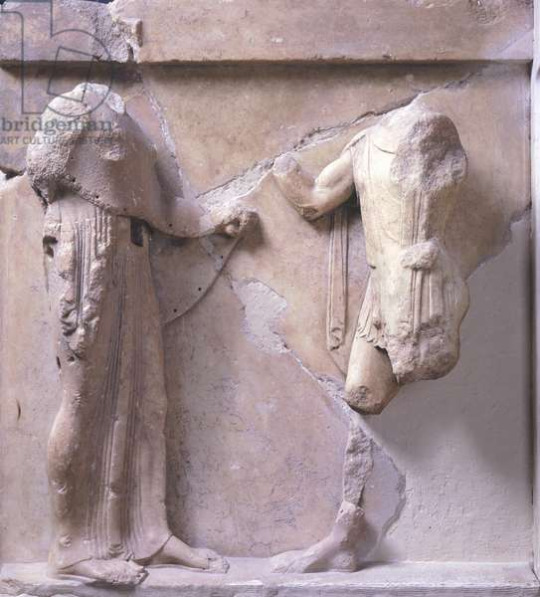
One of the Metopes of the Parthenon, showing (probably) Athena and Theseus.
As a result, ancient texts never show the entire story; they select the moment they want to tell and focus in on that. Hence the Iliad focuses on Achilles’s wrath, the Odyssey emphasises his homecoming, and the Argonautica tells the story of the Golden Fleece. Similarly, tragedies will choose a meaningful moment: not all of Agamemnon and Clytemnestra’s struggles, but his return home in the Agamemnon, or the events that lead directly to Pentheus’s dismemberment in the Bakchai.
So finding one text that will give you a useful overview will be hard!
These heroes are often also connected to so many other famous characters, that sometimes they show up as a side character in their stories, so it depends on which stories capture your interest most.
Pre-Homeric texts are few and far between
But this is not to say there aren’t pre-Trojan-War myths!
There are loads! Anything with Heracles or Theseus is pre-Iliadic, and others, like the house of Pelops, link more to the Trojan War but are also separate from it. Plus, there is Hesiod’s Theogony (roughly contemporary with Homer), which tells of the births of the gods and goes all the way back to the start of the universe.
The Ovid situation
Many Greek texts are lost, and we’ve only got allusions to this or that part of the myth in the existing fragments, etc. etc. So how do we still know so much about so many of these stories?
Enter my fave: Ovid.
Far later than Homer (1st century versus 8th century BC), but with access to all the Greek texts and them some, he wrote a lot of fairly comprehensive stories. These include the Heroides, letters written from the perspective of female characters trying to connect to their male lovers, with letter 10 coming from Ariadne to Theseus, and Metamorphoses 8 with parts of Theseus’s story.
If you’re looking for a high-level overview of what was what in ancient myth, starting with the Metamorphoses will give you all the big boys and many of the smaller ones.
Theseus specifically:
I must admit that Theseus is not my strong suit, but sources I’m familiar with that I would recommend:
Hippolytus, by Euripides and Phaedra by Seneca: these both tell of Theseus’s second wife Phaedra falling for his son Hippolytus and causing his death
Catullus 64: A lament from Ariadne after Theseus has abandoned her on Naxos
Metamorphoses 8, 12, by Ovid: Snippets of Theseus’s life, incl the Minotaur
Ones I’m not as familiar with but might be up your street:
Life of Theseus, Plutarch: a historian/scholar’s biography. He had them in pairs, where he compared the two; Theseus is linked to Romulus
The Argonautica, Apollonius Rhodus: Follows Jason in his quest for the Golden Fleece; Theseus is one of his heroes
Oedipus at Colonnus, Sophocles: apparently Theseus is a major side character here but I don’t remember!
There is also The King must Die by Mary Renault, a modern retelling from the ‘80s that blew me away. The only book set in ancient Greece I’ve ever read that doesn’t shy away from how alien their culture and values are to us today and doesn’t try to sugarcoat things.
And if you’re looking for more heroes: Wikipedia is your friend!
The Classics-related pages are pretty reliable, and they often mention the main sources per character.
I hope this gets you started but please do hit me up with more questions, I always love diving into these things!
88 notes
·
View notes
Note
thank you for your answer, in any case I was already very excited by your comic and I cannot wait to read more about it!
I honestly cannot understand the people hating on your work. I feel like fandoms has been invaded by a wave of purity/moral policy that shouldn't exist anymore. it's even more wild to me knowing you're working on a greek myth, and the greek myths are KNOWN to have many versions. that's the beauty of them in my opinion, the way these authors all wrote their own versions and they passed them to us. I love the fact you picked Ganimedes, and you decided to explore both Zeus and him. And the mystery you keep about your relationship really makes me wonder which take you will follow!
and speaking of take, I really enjoy yours on Zeus. Gods are complex beings, and sure they're problematic (like duh) and bad, and everything but it's funny how people will decide which pick for who. Like everybody love Poseidon but oh boy, he can be as bad as Zeus people. So yeah, I am actually excited to read the way you're gonna write him! I don't hate Zeus, sure he does seem one of the "worse" when reading most of the myths, but my favorite thing is the way you can love one god in one story, and hate him in another. they're immortal beings. they're not just black and white. so I happen to enjoy when authors write Zeus as more than just a big bad villain. But I also enjoy when they just don't make him a "sweet lovely daddy".
Oh by the way, I didn't know the version of Metis abusing him and I'll have to look into it! We had a more "feminist" vision of her myth in my class, so it's not something that was talked about hmm.
Also, my bad for saying he died. It was a sum up because of him turning into a constellation. I cannot say we studied this myth so unfortunately I don't have sources to help you on it! It's assumed he lives on forever young but the fact he turns into a constellation is why people think he died?
Thanks! I want to post soon, but I'm so tireeed ;w; I prefer to make people wait and do a good job tho.
About the hate... People re affraid (artists have to much power kkkkk) and we live in a time that you need to share your opnion to get validation. In my case, they need to say that Zeus is bad and hate on him and me so they know they re on the rigth side and have good morals. And even after all this, I think its a good thing they just warning people, that way I can get to my real target that can enjoy characters more complex that re not good or evil, but mess up beings (that includes Ganimedes). And even if people in the end critizied my aproach, its also fine, I dont claim to be perfect and just hope that even to the mad ones, they feel inspired to create their version as well. I think they forgot that, like, they can have their version and will be as valid as mine, dosent matter the story.
(I really enjoy everything about Ganymede, if people go and do their versions, its a plus to me! More about him is best for me heheh. I came across two versions of Ganymede on tumblr and I LOVE BOTH!! I really want to do a fanart of the second one, but I'm a lil afraid if they dont want to interact with me, which is fair, but I'm just judging by the dark aproach on the myth, as a horror story).
Thanks for liking my Zeus u.u I'm really more found of him, as I think about his past, but I'm trying not to focus to much on him! He steals the scene to much!!!
About Metis, its not a version, but a interpretation. I'm looking to see if I find a sourse, but anyway, its intresting, since they met when Zeus was still young. And there re some greek myths with female abusers, so... its something.
Oooh! I see. hm... I never see the constelation as a death, so its not clicking with me, but I understand. Any way, I kinda dont like the constelation, for some reason looks wrong to me, but its a valid version and Im totally using the aesthetic kkkk
19 notes
·
View notes
Text
you flare, you flicker, you fade (and in the end, all your tomorrows become yesterdays) [ megatron / reader ]

" I don't have a heartbeat,” She sighed sadly.
He regarded her, standing by the window. Under the half-light, her limbs look almost translucent, pale if not a little blue. That's what happens to organic skin when it oxidises to rot: tearing at the seams.
" Neither do I."
In which Megatron believes the personification of his guilt against humanity has come to haunt him in the late hours of the night.

rating: not rated, sfw! + themes & mentions of death
relationship : megatron / f!reader
fandoms: transformers (idw generation one) / idw 2005 / mtmte & lost light
characters: megatron (transformers), ratchet (transformers), terminus (transformers), rodimus | rodimus prime, minimus ambus (transformers), rung (transformers)
additional tags: angst, tangst with a happy ending, pov third person, idk how to tag this, refrences to edgar allan poe, references to ancient greek religion & lore, inspired by corpse bride by tim burton, the reader is referred as she and there's no usage of you but she/her , mentions of myth & folklore, euthanasia warning, death warning
This is reposted from ao3 as it’s quite long (3,171 words)

" She said: when will we meet?
I said: A year after the war ends.
She said: When will the war end?
I said: When we meet"
— Mahmoud Darwish
01.
After Trepan — after everything — Megatron doesn't dream. He can feel his processor spin and think during recharge, but he never dreams. And so when he dreamt for the first time, he almost forgot it was possible. Almost.
His dream was a kaleidoscope of images, a flurry, a blur. His body was moving, but he remained still, watching a memory that didn't belong to him. And he knew this because he could hear the sea.
The universal translator is too gentle. There wasn't a word to describe the great ‘seas’ of Cybertron. Back when he toiled under Nova Point, he assumed — like everybody else —that liquid water was a rumour. And then he saw it, deep, silver mercury, unlike anything, roaring beneath the horizon. Yet he dreams of a sea he never saw, dark and vacuum, sealed under a storm.
Rodimus banged on his door. He was forcibly woken. Even when they were talking by his doorway, Megatron could taste salt in his denta: so foreign his intake nearly rejects it.
02.
It started with the humming. It was so quiet that Megatron wouldn't have registered it if it wasn't for how foreign it sounded: non-mechanical and soft. Too soft. A glitch in his audials was likely, with the fool's energon slowing his processor. Yet he remained sharp, vigilant the moment the sound rang from down the hall. As he tried to listen to the silence, the ship thrummed underneath his pedes. Everything else was in the right place: electric, electronic, the usual clicks from the coolers, the vents drumming above. And yet the tune remains, faint if not fading. Drift was soundless. And he was trying to focus. So when the mech asked him what was wrong, Megatron blamed the startle on the fool's energon.
03.
She watches him from the corner of his peripheral. Playful. Shy. His optics drifted from the PADD — carefully, to not alarm Minimus — to make sense of her. Ratchet said internal hemorrhaging of the wires could lead to hallucinations, where the cyberium that lined his cables would inflate and leak; poisoning the Energon.
Behind him, she waved, wrist and elbow sharp and jutting, in contrast to the smooth, metal backdrop of the office. He diverted his attention to the conversation just in time. And when Megatron raised his helm again, she was gone.
Ratchet gave him the clear; he wasn't in any way incapacitated. And when he tells the CMO about tasting salt in the back of his intake, all he gets is a funny look.
04.
Cybertronians don't have taste receptors for sodium chloride: ‘salty’ doesn't exist in their vernacular, only recently introduced through the translator. The closest word they have to describing Energon is that it burns. Just a little bit. Alkali and acid dissolving against the dentae: bubbling like sea foam against the sand.
05.
She is the name of the unknown. She died in Cybertron many, many years ago — in a time before him, in a time before the war. So those who walked after her used the pronoun to describe the unfounded. Those without dichotomy, those without truth. The Lost Light is she, and so is the vastness of space. Nautica — who is she, herself — refers to her unsolved equations as her, and so does Perceptor. She is the graveyard of hypotheses, waiting to be kissed alive.
So it’s only natural for Megatron to think she 's lab-made. An experiment went wrong, a failed refraction of light. Brainstorm did say he was experimenting with holoforms. And yet the scientist never recharges in his room down the hallway: always too busy and never wanting to be alone. So Megatron observes her like she is a creature out of a petri dish.
The ghost blinks. Once. Twice — eyelashes, batting against her rotting cheeks.
It's rude to stare. She laughed. The sound was an airy, feathered thing.
She doesn't seem perturbed by the fact that the left side of her jaw is hanging by the threads of a torn muscle. With the epidermis of her chin loose and gorged, he could inside her anatomy.
Dark red and wet, not even Brainstorm would replicate something like this.
Forgive me.
She held the wilted bouquet in her hands a little bit tighter.
It's usually bad luck for the groom to see the bride before the wedding. Do you believe in that?
Megatron doesn't know what he believes. He lies on his slab with her sitting by his window, and he thinks of the question as recharge swallows him whole. He was on a ship, lightyears away, and all he could think of was the texture of her throat as it flakes and cracks.
He doesn't believe in bad luck, yet humans have many names for it: karma, kismet. Megatron wonders by which name he should call her.
06.
It takes him milliseconds to learn. Everything he needed to know about humans was handed to him on a silver platter, convenient and superior. Is this why he had thought of himself so high compared to them? Self-fulfilling prophecies who were so Darwinian and slow and stuck in their ways.
(Yet, in the end, weren't they like that as well? Eons to live for, and yet they waste it on killing one another. He wasted it.)
He has lived through the birth of her first rivers, the christening of her people, and the rise and fall of empires as they pile atop one another. The passing of thousands of eclipses that humans can only dream of witnessing once within their finite lifespans — and yet here he was.
The humans would call him Icarian; held together by wax and pretending it was metal, plunging to his hypocrisy as he strays further from the sun.
07.
Why a thing so innocuous? So naive and so docile.
A girl in a wedding gown.
Even when his mind tries to conjure up something beautiful, he still finds a way to corrupt it. Maybe that's why she's undead, ribcages peeking out of the tear of her dress yet never heaving to breathe. He buried his guilt, and she decayed. It's perverse and he loathes himself for it.
Megatron tells himself that's why she's here. To make him answer for corrupting her soil, and even if his pillage on Earth felt like a lifetime ago, he remembers.
The only bride that he could think of was a dead one. What does that say about him?
Without Soundwave, at least not directly, he was safe in the knowledge that no one aboard the ship could spy into his thoughts. They would find him appalling — more than they already did.It was a good thing that she very rarely approaches him when he’s outside his quarters. And in the rare instances she did, no one would acknowledge her.
The end of her dress, dragging across the floor.
Ravage tries to convince him he’s been tampered with, that it’s shadowplay. He threatens to tell Soundwave and Megatron lets him. He tells him to do whatever he wants, as long as he leaves them alone — unless, of course, he’s content with listening to an invisible orator. And so the panther slinks back into the dark resentfully, muttering to himself about how the mighty Megatron’s gone mad.
He has, hasn’t he?
08.
She remembers nothing except the ocean, cold and majestic. Where she emerged from the tides — and he notes that her predecessor, their goddess of love, was also born out of foam — flush with the sheen of the sea.
Then is grief born out of the sea? Megatron thinks. Did the Olympian create it at the same time she created love?
No. But people fight for love and love to fight. So love married war. She explained. The dyads then became synonymous.
And is that what we are? He asked her. A sequence of two, bind together to marry?
She smiled at him — bright enough to distract Megatron from the bone of her jaw that shifted from the movement. Until death do us part.
He wanted to laugh.
09.
Terminus told him the ancient world was pitch black, and if anyone from today were to travel back in time to witness it, the emptiness would blind their optics if not drive them mad. A shadow so greedy that it crowds the air with its emptiness. That time, Megatron had briefly wondered if such nothingness existed. Yet, the same darkness had forged Solus: intelligent and beautiful, she was one of the first, flares of light.
He thinks of the Prime as she offlines at the hilt of Megatronus' Star Saber. And even in her death, the last words she spoke were about love. Was that the start of the chain reactions that lit up Cybertron? Which of the two sparked the lucidity that charged life into the millions of dormant sparks? Her death or her love?
(He has to remind himself that the same love killed her.)
10.
The truth is symmetrical, cogs in the right places. Perceptor argued.
Nautica rubs the side of her helm with both servos. Her tools, messy on top of the table.
Yes, but you see, we won’t be travelling in linear time. We’re planning to break free from that. If symmetry is your truth then where will that leave us once we go on a loop?
Something inside him hitched. Oh.
All optics were on him.
What? Rodimus urged.
Nothing. He lied. I didn't know we could get stuck in time.
That’s what happens when you don’t move on. Brainstorm shrugs. Time freezes you. So you have to learn how to melt it.
11.
She says she feels cold. He assumed she felt nothing, numb as she fluttered her fingers experimentally on the shell of his armor. Numb with the same indifference she had with the lack of oxygen aboard the ship.
He didn’t stop her, trying to etch the feel of her curious touch. It felt like nothing, feather-like and ghosting across the surface like a stray draft of wind. He has to mentally fill in the gaps himself, and if Megatron thinks hard enough, he can pretend the warmth exists. That it lingers and clings to him.
Her fingers run along the ridge of his chin and the underside of his palm. Yet he's still not enough to chase away the cold.
No matter how hard she tries, her kindness has no source in his stout and unyielding world. And so he is left to wonder what it would be like if she didn’t oscillate in and out of time and space. To feel her, whole and alive, would be mercy. That would be unfair.
Time and time again, he'd ask her: why are you here?
I'm waiting for my husband. She'd tell him, small against his open palms. We're going home.
Megatron feels as if the air compresses when she speaks.
Where is home? He'd ask her. Intake dry as he swallows salt.
The darkness of his habsuite doesn’t seem to touch her features, which appear bright, as if a private sun were hanging above her brow. She'd motion for him to come closer and brush her tiny lips against his. It felt like nothing. She was a shadow that had casted herself across his face.
The sea.
12.
Megatron observes the little trinkets littered across Rung's office. They were tidy and upright, great big ships, each marking well-known voyages and exoduses. He imagines them cutting through the galaxy's undercurrent, great, metallic sails, reeling through the vortex of nothing.
Then he catches it, the small, black figure tucked away at the top-right corner of his shelf.
Rung turns around in his chair to follow his line of vision.
The humans call it a raven. Of course, they don't come in the same size. They're small, as are all things Earth.
Laserbeak is sleek and sharp. Sentio-Metallico down to his core. Yet this bird — the real one — is a void with shadows. Slender beaks made of meat, and bone for claws.
Humans called them omens.
And who would gift you a warning?
The psychiatrist looks out the window, round-rimmed glasses, clever under the light.
I don't remember. He lies, and the next time Megatron enters his office two days later, the bird is nowhere to be seen.
13.
If she is born out of the sea, then that must make her a siren. She still hums a tune he’s never heard before. And it did lure him. And when Megatron tells her this, she shakes her head.
But a mermaid has no tears, and therefore she suffers so much more.
Cybertronians don’t cry either. He told her. And the look she gave him was withering as if he had trapped all the light and left her to sit in the dark. He was, after all, empty if not made of black holes. Is that why his spark feels heavy all the time, dense with the magnitude of his sins? And when the weight becomes unbearable, he tears himself apart, and with it he cuts through the fabric of space. The anti-matter was now leaking out of his optics, crawling past the sutures, wringing him iode by iode.
Someone was calling him, but he couldn’t hear. The forcefield was cracking, shattering with him.
It was excruciating. Yet amidst the throes, he feels it, the light-headedness, the gradual rise and lull — in a way, he was crying. Maybe he was also made of oceans.
14.
Megatron found a flaw in her story. Love didn’t marry War, and before they eloped, Love had married Creation; Solus has always been fond of metallurgy. That was her alchemy. And Venus used to seek refuge in the fire of her husband’s forge. Yet she was unhappy — why is that?
Why was he?
You could have been a creator. His corpse bride mused. That’s why you wrote.
I still do .
Do goddesses feel remorse? He thought maybe she didn't. War seduced her. And she had let him corrupt and penetrate and ravish. Megatron reminds himself it was symbiotic; she loved his wrath and his power. The Sun was their witness, and he claims she was unhappy because Creation was unkind to her. So she stared into the abyss.
And Megatron understood.
He thought of staying idle and evanesce under the mines, private and forgotten, without having dented the surface of his homeland. Now they tell stories of him, and his name is forever carved into the macrocosm. If not by words through wounds. And as the universe ages into senescence, will the pain — which echoes and expands like the gases under Croteus 12 — continue to bleed through generations to come?
Outside, he could see the field of flowers. Ebullient blue, swaying gently with the wind. With the sun on the horizon and dusk to chase away the chaos of the night, Megatron stared at Terminus, worn and confused — and refused.
This won't be my legacy .
15.
In another life, she promised, you could be a creator .
And what will I create ?
She was small, so small that he had to lift her up to his face, where she could make a motion to hug the side of his cheek with her body.
(Destiny had always made him feel small, she even more so.)
Love. You will love me.
He supposed that’s possible. He wanted, once a very long time ago, to be a medic. And maybe he could even be an explorer as he was aboard the Lost Light. Searching for lost things. Searching for her.
The blue, luminescent light above him flickered. And even higher above — two, three levels up in the sentencing chamber — the jury was deciding his fate. Footfalls chased away the sound of the sea. And so he pulled out his Rodimus star, crumpled and yellow, sitting in the middle of his palm.
She smiled sadly at that.
And will I love you well ? He asked.
You know you will.
16.
It’s like falling asleep. She promises.
He was falling into recharge, but the word sounded garish, rough. Sleep sounded more like drifting. Sinking. She was there when he laid across the slab, where the monitors beeped and chirped as they pumped fluids into his cable — and he let them, drawing the curtains close.
She tells him to inhale, teaching him how to breathe. (The juxtaposition of it all made him smile inwards.) And when the air rushes past his intake, he could taste it again. The pull, the push, the hum of the great, big tides. They roll and crash into the sand, disappearing into froth. He dreams of standing across her, now at the same height, face to face.
No longer was he her resting ground to haunt.
On the branch of a tree that appeared above him, a raven swooped down. The beating of her wings, tumbling through the mist.
My dear , the creature spoke. He belongs to the gardens with the rest of my brother's creations . You belong to the sea. With me.
His bride was pleading, telling her that life has parted them, so it would only be right for them to be joined here.
And as if pausing to give her words a thought, the Raven turned to the west and crowed. Though you may not remember it, we have been here before. It will only be fair if I would send you both back. But know that the end stays the same. What is mine is mine, and what is my brother's is his.
Megatron doesn’t dream, but now he lives in one — where reality is no more than a distant memory, an echo from another, linear time. And so the ferryman lets Megatron guide his bride atop the boat, so they can sail out together, into the sea.
17.
De ja vu , she called it. A memory she had lived through before, even if it wasn't hers.
We are traveling in a loop. It's true. The quantum jump had worked, and now they all live in a forever dream, conjured up by Brainstorm and Perceptor's simpatico. The Earthling ran a nervous hand down the creases of her clothes, hesitant with her next question. Yet, Megatron was patient. (Waiting, it was as if they were both used to that.)
I think we met in a previous life.
The glass atop the tabletop gleamed, and in the space of Swerve's bar — where the bartender was too far away to intrude — Megatron could hear the song of the ocean. There was no point in lying. He did come looking for her. And here she was, whole.
I think we did.
"And so, all the night-tide, I lie down by the side
Of my darling—my darling—my life and my bride,
In her sepulchre there by the sea—
In her tomb by the sounding sea."
— Annabel Lee, Edgar Allan Poe
#happy late halloween lol#transformers#transformers idw#idw mtmte#idw transformers#maccadams#transformers x reader#transformers x you#tf mtmte#mtmte#transformers mtmte#mtmte x reader#mtmte one shots#lost light#transformers lost light#tf headcanons#tf imagines#tf idw#transformers headcanons#transformers hc#tf hc#lost light x reader#lost light au#transformers one shot#megatron idw#megatron#megatron x reader#megatron / reader#one shot
110 notes
·
View notes
Text
“gojo and geto as achilles and patroclus this” no you fucking fool!! who is the figure from greek myth who is smart and strong and gifted and of a noble line and yet is characterized by constantly getting his ass beat and losing over and over again and over a decade of loneliness. and everybody acknowledges he’s the best in the game but is also a PAIN IN THE ASS to be around? ODYSSEUS
37 notes
·
View notes
Text
She Creature
Prompts taken or adapted from the 2001 horror fantasy creature feature (but this time it's all the sailing-ship/myth specific ones.) Feel free to shuffle the pronouns, etc.
“You're right to think me strange, but you'd be strange too if you knew what I know.”
“All water holds hidden magic.”
“In Greek mythology, sirens were originally bird women, then somewhere along the line, the story mutated into fish women.”
“Mermaids are myths, everybody knows that.”
“They sing, they dance, and they lure the sailors to their lair with their pale flesh.”
“The story goes that every year, under the strongest of the full moons, the mermaids become human for roughly one night.”
“You skipped the part where the creature bites the hand that feeds it and you end up a paranoid old fool staring at it day and night and night and day.”
“This is history and archaeology and spectacle all rolled into one.”
“Did I tell you the one about the hangman and the hawk?”
“Must be awful for you, listening to all this sailor talk day and night.”
“I'm telling you- don't be fooled by what it appears to be! ”
“I don't think any explanation could satisfy.”
“Give me one good reason why I shouldn't throw this thing off my ship right now and you with it!”
“I've had men flogged to death for less.”
“Think of it as the greatest treasure any man has ever discovered.”
“You divide your share any which way you see fit.”
“You're looking at the good luck charm of a lifetime.”
“I'm going up for some fresh air.”
“It reeks down here.”
“Perhaps the ocean air is bringing out the animal in you.”
“I don't care how much treasure we're promised, that thing doesn't belong here.”
“Look, acting the clown's one thing, but you're playing with everyone's safety and you know it!”
“See that over there? Like a mass of shadow? It's an island.”
“I don't care what you do just turn this thing around!”
“It can and will rip the guts out of each and every living being here tonight.”
“The bullets are in the captain's quarters, come on.”
“What the hell is that thing?”
“I'm not waiting around down here.”
“An island full of mermaids - that's why we're here.”
“No one gets to see the forbidden islands and walk out alive.”
“You told me "let's take a mermaid to America, get rich and famous" not "let's steal the queen of the what's-it what turns into a monster and eats people"!”
“I think I would have remembered the difference!”
“What happened? Where's your crew?”
“Eventually our journey became a footnote, a bizarre unresolved tale.”
“I'm just going to check below and make sure everything's alright.”
“Some things, no matter how magnificent they are, are best left alone.”
#rp meme#rp memes#rp prompts#fantasy prompts#mermaid prompts#age of sail prompts#inbox starters#at least one of these is probably too specific to realistically get much use but it's just so fucking funny 2 me#meme#memes
39 notes
·
View notes
Text
Dionysus' lesser-known myths [or perhaps you do know them, but i will tell you about them anyway]
Some of these myths have already been shown in my blog, but i decided to bring some of them up again in a more elaborated way, plus some new too. Perhaps you've heard of them, perhaps you haven't, but i can tell you i haven't seen them much around here.
And my job isn't reading your minds, it's about writting essays, so here we go.
1. Ampelos (Αμπελος):
According to Nonnus of Panopolis, Ampelos was a satyr (tho not many art represents him as such) who loved Dionysus, and was loved by him as well. Not much of a surprise, since we do know many gods had male lovers.
The problem is that, we're still talking about a satyr, we know how those guys are and act. According to Nonnus, Ampelos was riding a bull while mocking Selene, angrily, she sent a gadfly to sting the bull. The bull ran and threw Ampelos all over the place. Nonnus describes it as a very gore-like death.
Dionysus, upset, ended up turning Ampelos' corpse into a grape vine, and from there, he created wine with his blood... THANKFULY, it was the blood.
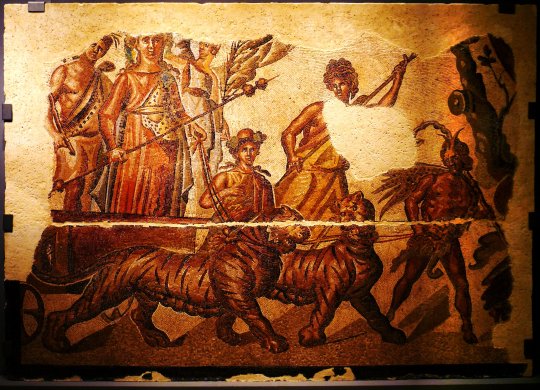
Roman mosaic with Ampelos and Bacchus.
2. Midas (Μίδας):
"But Nysus, everybody knows Midas" yes yes, but do you KNOW the actual Greek myths? Or do you know the later, VERY later-on version that appears in Wikipedia? Midas never turned his daughter into gold in the folklore, for example.
Midas was a foreign king who married a greek woman, he was the king of Phrygia, and according to Pausanias, he had a daughter named Zoe. I have absolutely nothing about her except this.
Anyways, going to the important part: Silenus, a companion of Dionysus who used to be one of his foster fathers, got lost while he was... Kind of drunk ( come on, Dionysus can't keep an eye on everyone 24/7 ). Some peasants found him and took him to King Midas, who, as a very loyal follower of Dionysus, recognized Silenus and took care of him. When Dionysus arrived in order to take him back, he thanked Midas and said he would give him in return anything that he wished for... And here it comes: Midas wished to be able to turn everything that he touched to gold, and Dionysus agreed, even though he felt sorry he hadn't thought of it twice.
Midas was happy turning stuff into gold, obviously. But when he touched food and it turned into gold as well and he was unable to eat, he returned to Dionysus asking him to turn it back to normal.
Surprisingly, Dionysus didn't say "no" or "live with the consequences"; he told him to wash himself in the river Pactolus, and, good enough, the gold thingy dissappeared.
I don't have this myth fully narrated by a Greek, instead, from a latin author. The good thing tho, thanks to Herodotus and Pausanias, i know it's realiable.
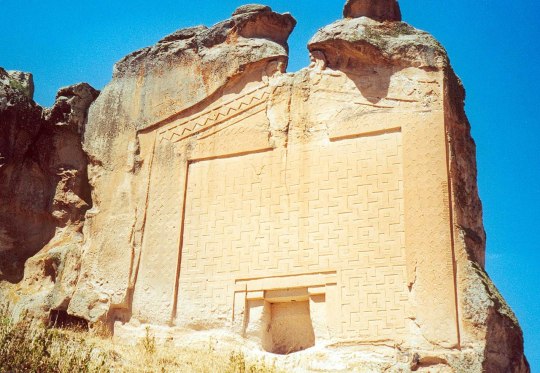
Monument dedicated to Midas, in the old Prhygia ( now part of Turkey )
3. The Minyades (Μινυάδες):
According to Plutarch, king Minyas had three daughters ( whose names i honestly don't know, they appear in Ovid's Metamorphosis ). He tells that Dionysus appeared in the form of a maiden to invite them to the Dionysian Mysteries, since the rest of the women had already gone there. And they declined, politely, but still declined. This is one of those moments in which we see Dionysus' weak points, no justified anger. They neglected the cult, but had nothing against it anyways.
Still, for him, that wasn't enough.
He drove them mad, like very. Something that for Plutarch was even worse than death, apparently. They even killed their own children and ate them (yikes) dismembering them like Dionysus was once dismembered. The sisters were wandering around the mountains, without Dionysus caring at all.
Until finally, Hermes took pity on them, and turned them into bats, freeing them from the madness.
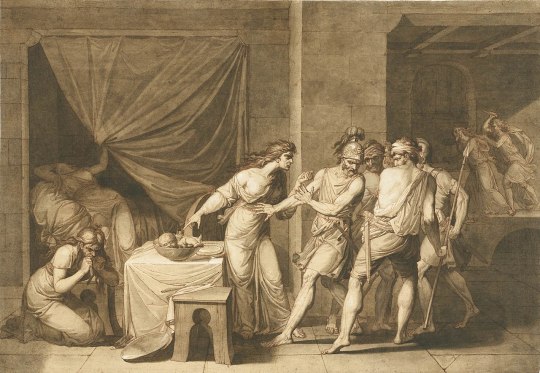
One of the Minyades showing the dismembered body of her son - Étienne-Barthélémy Garnier
4. Zeus' lighting bolts
This one is short, so i'll get to the point.
We all know what Nonnus' was up to when writing about Dionysus. He said in his work that Zeus recognized him (when being Zagreus) as his heir. Since when he was still a little kid, he was able to climb to his throne and to hold Zeus' lightning bolts. Of course, then the very well-known myth of Hera calling the titants to dismember Dionysus arrives here, since she wanted no heir to the throne.
Things happen, you know.
5. Lykurgos (Λυκοῦργος):
Remember when i talked about this guy in the anger essay? Wellp, here he is again, it's the same, but i'll elaborate on him a bit more.
He was a thracian king, and when he heard that Dionysus was going to Thracia, he ordered to trap all of his female followers in a prison.
Yes, only the women. I guess no men followed Dionysus in Thracia during his reign, not like i can ask him about it.
OF COURSE Pentheus 2.0 would imprison the FOLLOWERS of the god of MADNESS. Of course...
Dionysus got angry ( what a surprise ) and sent a drought towards Thracia + making Lykurgos go mad. It's not Dionysus if he doesn't punish you by making you go mad.
He then proceed to tell the people that the only way to stop that punishment was by killing Lykurgos, and, well, they did. They all killed him, and were freed from the punishment.
Dionysus then stopped the drought, he kept his word, indeed.

Lykurgos attacking his own wife after being induced into madness
6. The punishment of the titans
You think they got away? No, the fuck, of course they didn't.
After Zeus' found out what had happened to Dionysus (Zagreus), he imprisoned them in Tartatus, which caused Gaia to be all sad again, since many of her children had already been imprisoned there. What she did was, as scary as Gaia has always been, burning down everything she could.
The only way Zeus could take pity on her in order to stop that, was by sending a flood.
7. Coresus (Κόρησος):
Callirhoe was a Calydonian woman who scorned Coresus, a priest of Dionysus, who threatened to afflict all the women of Calydon with insanity as the good Dionysus priest he was.
The way to stop this was with a sacrifice, to kill the woman who scorned him. Coresus was ordered to sacrifice her, but he killed himself instead since apparently, he was in love with her and couldn't do it.
Callirhoe was overcome with remorse, and cut her throat at a spring that later received her name.
As always.
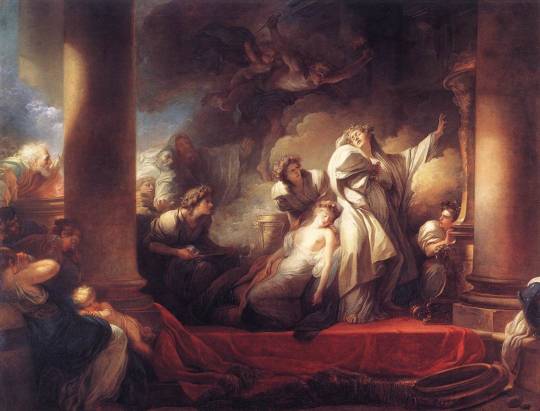
Coresus sacrificing himself to save Callirhoe - Jean-Honoré Fragonard
8. The Frogs (Βάτραχοι):
At this point, this isn't lesser-known anymore, and i'm not the biggest fan of Aristophanes' work (i love Euripides way too much, oops) but i'll still summarize what Dionysus has to do with this play.
Dionysus, as the god of theatre he is, wanted to bring back to life one of the great tragedy authors. And he descends to Hades for that, it's a way to mock his connection with it, this is still a comedy.
And after a poetry slam, Aeschylus is chosen in preference to Euripides. Smh, fucking Aristophanes, way to put your preferences.
9. Orpheus' death:
I'm not gonna elaborate on this one THAT much, since i wanna save it for the Apollo & Dionysus essay i have unfinished, which was the second most voted one and it might take more time to finish it.
In any case, do you know all these modern retellings in which they paint Dionysus as the "chill, calm, who only wants to party" dude? And Apollo as the "feral, envious, angry" dude? Well, ya'll are wrong...
Dionysus killed Orpheus due to his jealousy of Apollo's worship. I'm leaving you with this sentence, wait for the other essay to know why Dionysus and Apollo are so complex in terms of feelings. Or, at least, i will try to elaborate on it.
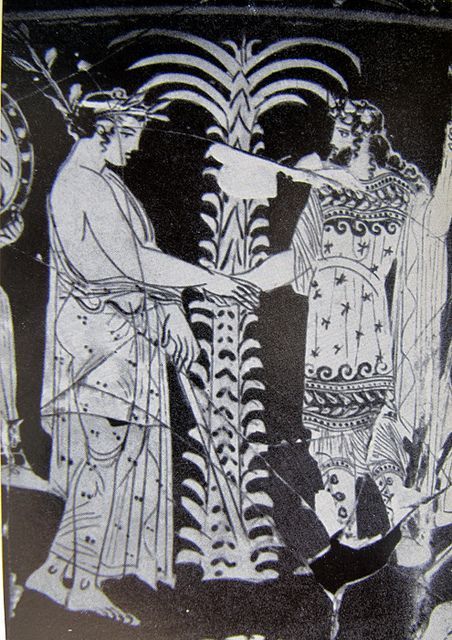
Apollo welcoming Dionysus to the sanctuary of Delphi, which they shared.
10. Dionysus IS physically incapable of getting drunk, live with it:
SHOCK i know. So if i see any of ya'll saying he's drunk 24/7, you better have your testament written.
NONNUS OF PANOPOLIS. DIONYSIACA. LITERAL TEXT: "Only to Dionysus gave Rhea the amethyst that saves the drinker from the chains of madness."
Yes, obviously going for scientifict facts, this doesn't work. It was believed in this world that the amethyst would prevent people from getting drunk. But this is mythology, Dionysus is a god, he can't get drunk even if he wanted to. And it's not like he should, he needs to keep an eye on his followers 24/7. Or do we want to remember what happened to Silenus?
Dude, how the hell do i have to tell you all, that in all text in which people were drinking for honoring Dionysus, they always stopped saying "he wouldn't like to see us this way" HE DOESN'T WANT YA'LL DO GET DRUNK. THAT'S NOT HOW HIS MADNESS WORKED
No. The women in the Bacchae are not ✨girlboss slaaaaay✨ they were feral women. The madness Dionysus used to punish Pentheus and the Theban women is NOT something you should idealize. Euripides didn't want ya'll to call him an icon because "omg the Bacchae is so progresive" GUYS... NO. IT'S NOT ABOUT THAT. It's about showing Dionysus' wrath. Of showing why like with any other god, he's feared.
The Greek gods are not your free playground OC's. You can't invent their sexualities or gender identities just for yourself. They're important figures of a culture and country that still lives. If you want an icon to feel identify with, create one. But don't go around there saying Dionysus is genderfluid JUST because you like seeing him young. No.
I know, personally, genderfluid people, and all of them agree THIS is wrong. I already had the whole pronouns drama with Dionysus, don't start over again with this. Please.
* AHEM * In any case... Hope you enjoyed !
I needed to work A LOT for this essay, since most of these myths weren't listed with sources. Whenever you wanna write a guide about folkore or anything similar, please, list your sources ! i don't want anyone else to go through the pain of needing to research though the catacombs of information JUST to confirm one sentence. Because i went trhough that, there's a reason why i've been researching about Dionysus for more than three years already and i still don't have everything. Thanks for your support and essay requests as always, it makes me INCREDIBLY happy to see so many of you willing to learn about a figure that has been so underappreciated and reduced into nothing like Dionysus, and who is still being misinterpreted to this day.
As always, reblogs would be very appreciated, it's the way people can find my blog for something else than copypaste incorrect quotes, and i always appreciate that kind of support. Of course i do this "por amor al arte" as i would say in Spanish, but still takes time and effort and i'm just a university student. I still will need A LOT of time to be able to work into something more accesible to everyone for the Greek folklore.
For now, this small Tumblr pieces is what i can give. But as always, thank you and χαίρε Διόνυσον 🍇
211 notes
·
View notes
Text
While checking around for my “Roman gods are not Greek gods” posts, I found back this tripartition of mythology, which is actually a fact that everybody should kno about if they want to dabble in Greco-Roman myths (especially Greek myths).
We know that, during Antiquity, the Romans and the Greeks thought that there wasn’t just one, but three different types of “theology” - three different views, perceptions and reception of the gods.
The first theology was the theology of the priests and of the state - aka, religion. The Greek gods as perceived and described by religion, as honored through rituals and festivals.
The second theology is the “mythic theology” - what we call “mythology today”. It is a set of legends, folktales and stories that are not part of religion, but rather used and carried by art - it is the gods are seen, perceived and described by the poets, by the epics, by the theater plays.
The third theology is the theology of the philosophers - who used the gods and their tales as images and allegories for various abstract or concrete topics. It is the gods as depictions and description of natural phenomenon, or the myths as a way to actualy exemplify a social fact or explain psychological workings.
For the classic Greeks and Romans, there was a clear divide between those three very different point of view of the gods. It was basically three different versions of the pantheon. This is notably why you will find texts noting that priests disliked and condemned the poets’ mythological works, due to them being blasphemous and making the gods too human when religion described them as perfect ; and it is also why the philosophers of old dissed on and rejected the literary works of mythology as nonsense only good to feed superstitions, because for them the gods weren’t characters or realities, but rather abstract concepts and rhetorical allegories.
This is something I feel needs to be reminded, because today these three different theologies have been mixed up into one big mess - as literary myths are placed one the same level as philosophical “myths” (actually texts taking the shape of myths), and both considered of outmost religious importance. When in fact, things were quite different...
EDIT: I was asked if there was a myth that could illustrate the three different theologies, and on the spot I would say “the affair between Aphrodite and Ares”.
This story originates from the “mythological theology”. It is primarily a story, and a good one. It is the story of a husband who discovers his wife is unfaithful and tries to get revenge, it is the story of an extra-marital affair gone wrong, it is typical set of divine shenanigans ending on a grotesque display of divine humiliation - it is an excellent narrative material for plays and poems (and the legend does originates from poems).
The story was also dearly beloved and reused by the “philosophical theology”, because the philosophers adored the idea of the love between Ares and Aphrodite - for them it was the perfect depiction of how the concepts of “love” and “war” , despite being seemingly opposite, attracted each other and were closely tied. For them, this story isn’t to be taken literaly as “a god cheated on another god”, but rather as “this is an allegory showing that love and war are two sides of the same coin, which is why Aphrodite falls for Ares despite being married to Hephaistos”. But for them the whole net part is just poetic nonsense invented to make people laugh ; or maybe they will reinvent them as a moral, cautionary tale that should be used to warn people of the dangers of unfaithfulness.
And then there’s the “religious theology”, the point of view of the priests - for whom such a story is mockery and sacrilege. You can imagine them saying: “You are making the gods look like fools! Gods don’t cheat on each other, gods don’t get captured in nets while butt-naked, gods don’t even sleep on beds - GODS DO NOT EVEN HAVE HUMAN FORMS IN THEIR NATURAL STATE - what the heck is this bullshit you’re saying, you’re just insulting the gods by turning them into lecherous humans and grotesque clowns for your vulgar story!” (This is a reconstitution and not the actual words of an Ancient Greek priest)
#greek gods#roman gods#greek mythology#greek religion#roman mythology#roman religion#ancient theology
618 notes
·
View notes
Text
I decided that I have thoughts about @emberunderscore's Epic AU so you get them too— (also go check it out if you haven’t already! It’s so good and I eat it up)
He already shared many of their thoughts but I'm gonna share some of my Wisdom Saga ones (mostly as the first two one aren’t and the third is debatable—)
Also we do be ignoring the god relations in Greek Myths. We close our eyes and ears at them and let them leave our minds. They don’t exist in this AU unless said otherwise
also a bit of a long post so cut
the first “line” is what happens in Epic and the second is how my brain connects it to Fable
- Zeus basically forcing Odysseus to kill the infant
- Fable being the lead of arguably all of Icarus' murders
- Zeus making Odysseus imagine Penelope floating towards him in the sky with her hand out and singing a part of Suffering
- Fable keeping on reminding Icarus why they’re here. giving them a reason to let the rest of his crew die
which goes to
- Zeus being the cause of Odysseus getting to Calypso's island
- Fable isolating Icarus then getting to coworkers time
- In Love In Paradise, we get the time dive. Athena seeing the much prominent things that happened to Ody for the past 10 years
- Remember the memory Rae had before waking up in s3? Yeah. Similar but now Enderian is good and with a very older Icarus
- Calypso saying "open arms" triggering Odysseus's memory of Polities, Eurylochus, then dead mom times, causing his breakdown
- Ven saying something to trigger Athena happy times, Broter argument(s), and sad Isla time. also causing a breakdown
- Ember already talked about this one but— Ody ready to jump from the ledge to the flowing water. If all he’s gonna do the rest of his life is stay on the island, why bother staying alive? The only reason he’s fought monsters and sacrifice his friends is to get to Penelope. He can’t do that now. He can’t go see her. At least he’ll see Polities, Eurylochus, his crew, and his mom? At least he’ll see them….
- Oh, Icarus and your ability to just fall and fall every time. You fell both metaphorically and physically. And yeah— read it again but as Ic. (with the other characters being respective to their role) it’s literally just them.
- Ares being mad that Ody didn’t fight Scylla. I know it’s supposed to be cus he wants death and all that but
- Netherum being mad that Ic didn’t fight to protect the ones he cares about. He fought the cyclops and the sirens. why not fight back and sacrifice six of his crew instead.
(we kindly ignore that he would be calling Oscar pathetic and weak and that they accepted cus she said he’ll make everybody bleed)
also this is an exception with Netherum and Soul cus they’re Ares and Aphrodite who are married too
- Athena doing everything in her power to save Odysseus
- Enderian sacrificing herself to save Rae's life (I care that it's Icarus and not Rae in this AU)
I shared the idea of Zeus being Fable and not Epros. and since they had Hera as Kinaxus cus Zeus was Epros, their possession there was removed as it doesn’t make much sense. which got to Hera being Perix. here are the words that were shared but better (or worse, idk—)
- I get the vibe of Hera calling basically everyone “baby”, which means calling Athena that too, but
- what if gay cus Perix would be specifically talking to Enderian. we also know that Perix had feelings for her, so—
- and then we get Hera challenging Athena so she can save Ody. saying “Try harder” and “You can do better than that” to her
- I don’t know why, but this gives me them but before Caspian prison times, or even before the resets & the war of the realms. even though Enderian would’ve most likely not tolerated any of it
10 notes
·
View notes
Text
Theseus and women
Theseus is one of the most hated characters in Greek mythology on the internet and l wanted defend him because l love him and he's clearly, VERY clearly misunderstood. Now, by misunderstood l don't mean, "Oh, his father wasn't around so he was traumatized," l mean he is always characterized as this misogynist egoist man who everybody loves just because he's a MAN™, which isn't true at all. I'm not going to explain why l love him directly in this post but I'm just going to explain why people misinterpret his relationship with women, because other than his "misstreatment" of women, he's literally just a guy.
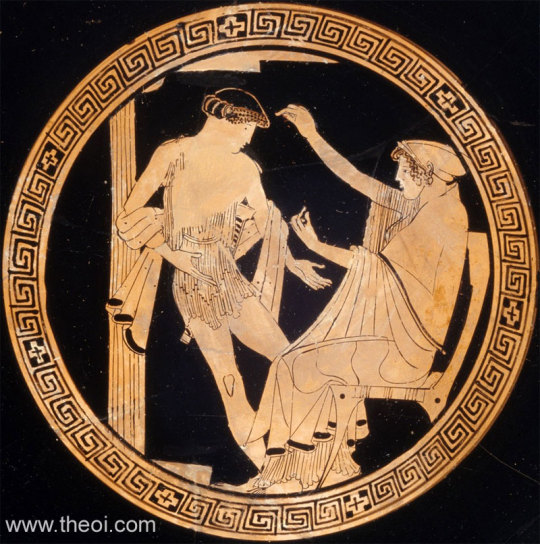
Theseus and Amphitrite
Like, look at him! He's just a boy! Anyways, let's start with the obvious reason he gets hate.
Ariadne
We all know the story of him leaving her behind and then Dionysus finds her yada yada. We don't know why he does this, some people say that he's just a jerk and did this dick move because he wanted to but l beg to differ. Many modern-day writers tried to explain this abandonment, though most of them just painted Theseus as a jerk like leaving her because she was annoying or like what l said, just because he's a dick. I was researching how authors reasoned him for his abandonment and guess what THERE ARE SOURCES ARE EXPLAINING HIS ACTION, 1) She was killed by Artemis, this is not a well-known one but it is an explanation of him leaving Ariadne behind, Ariadne was killed by Artemis while she was giving birth to his sons, l couldn't find a reason on why she did it but this is a reason, 2) Dionysus demanded him to leave her because he wanted her, some sources say this and even say that the reason Theseus forgot to change his sails was that he was sad about leaving Ariadne behind, now, does this mean he's an angel, no because some sources do say 3) Theseus willingly leaving her behind, however, they all give a different explanation. A reason l like comes from the book "The king must die" where Ariadne is participating in a human sacrificial ritual and Theseus doesn't like that because it reminds him of Medea or something. I don't know l just read it while researching l didn't read the book but l like it, Ariadne being all crazy and that because it would explain why she's great with Dionysus and her parents are both very cold people, one being a goddess and one being... Minos. I heard there are versions where Athena tells him to leave her but l couldn't find them so that could have been added very later. Now, what version do l see as the truth? None. I like the version my brother suggested, which is "He forgot,". HE FORGOT, HES FORGETFUL, AND HE ALSO FORGETS TO CHANGE THE SAILS. I like it so much because HES LITERALLY JUST A GUY. But, in all seriousness, you can dislike Theseus for leaving Ariadne behind since there are sources that say he left her willingly but check the other versions too.
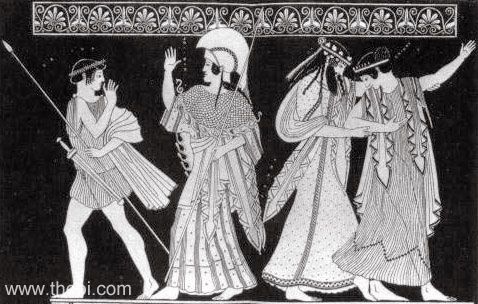
Theseus, Athena, Dionysus, and Ariadne.
Now that that's out of the way, let's see any other reason Theseus gets hate that involves yet another woman! Which is...
Helen
There is a myth that Helen is kidnapped by Theseus... That's it. So, for context (even though everyone knows it already) Theseus and his "best bud" (wink, wink) Pirithous are both demigods, Theseus being Poseidon's son and Pirithous Zeus's. Since they both have divine blood, they conclude that they will marry one of Zeus's daughters, Theseus picks Helen and Pirithous picks Persephone (like an idiot). They abduct Helen, yada yada, try to abduct Persephone but fail miserably, yada yada. And people dislike him because... he kidnapped Helen, yeah, okay, let's break this down. Kidnapping women was a very well-known thing in ancient Greece, was it acknowledged it was bad? Yes. But was it still there? Also yes. But this isn't about lust, Theseus kidnaps Helen because she is Zeus's daughter and he thinks he deserves at least a demi-god because he is one too. Can this be considered hubris? Yes, it can, and in my opinion, it is. Theseus has done very heroic stuff and wants something in return, he thinks that a mortal wife is too little for him so he picks what he thinks is the best thing for him, a wife whose father is Zeus. He doesn't do this as an act of lust, just hubris, and maybe for reputation, since Helen is the most beautiful woman, having the most beautiful woman as a wife is a thing to be proud of. But that doesn't mean Theseus gets what he wants immediately, because Helen is young, very young. He even acknowledges that as an Athenian, which is okay to marry a 14-year-old girl, but Helen is younger. Sources change her age from 9 to 12, but the point is, she's too young. So, Theseus decides he'll wait and gives her to his mother in the meantime. When he gets rescued by Heracles, he faces consequences, which is learning his mother is now a slave to Castor and Pollux. This is what l like about him too, he's a king, a hero, yet faces consequences more than anyone. Even if he doesn't, when he does bad things to another, bad things happen to him later, Karma bites him in the ass, and in my opinion making a character face consequences is the best way to make them feel human and relatable. Theseus isn't the only one, every mortal in Greek mythology are human-like character to me because they face consequences! Heracles, Achilles, Agamemnon, Odysseus, Bellerophon, and many more make bad choices, face the consequences, and acknowledge them! Theseus kidnapping Helen is a bad thing, yes, but he didn't even touch her because she was a child and his mother got taken away in the end.
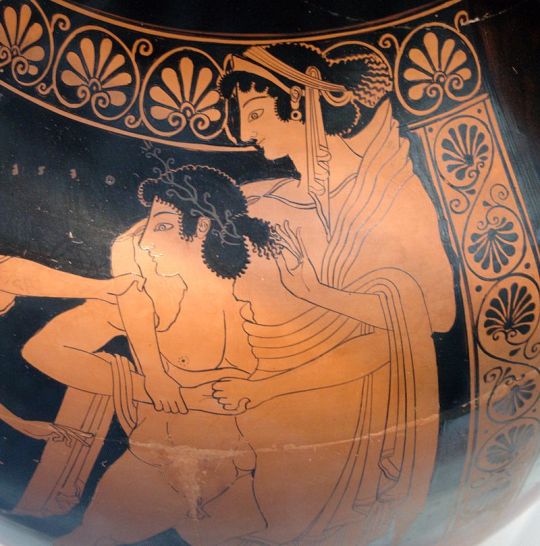
Theseus taking away Helen
So yeah, this is it. I was going to go into more detail about his relationship with women since there are women he helps and respects but this is all for now. If l made any mistakes, please let me know without sounding rude, l can take constructive criticism. Anyways, have a good day!
(@coloricioso was the one who asked me to explain my Theseus obsession, so here it is!)
#greek mythology#ancient greek mythology#greek myth#greek myths#theseus#ariadne#helen of troy#helen of sparta#I have to read so much#all the plays that have him in it#The life of Theseus#etc etc#If my attention span will let me#or my brain#anyways#I'll probably remake this when l read the plays and The life of Theseus#and make more posts about him#then I'll probably read the king must due#then Ariadne#then more#ALSO LET HIM MAKE BAD THINGS#not everyone is an angel#“Oh he did bad things!” SO WHAT#LET HIM HE CAN DO IT#Also did l mention how much l love Hippolyta and Theseus' dynamic#Amazon x Athenian king??? Sign me up#Hippolyta is going to destroy him#good for her#Im having so much fun in the tags#I hope people read them
63 notes
·
View notes